#Historical influences on health
Text
The Alarming Rise of Diabetes: A Call for Integrated Healing Approaches
In the span of a century, the prevalence of diabetes has surged from an estimated 1% to a staggering 11.6%, as reported by the CDC’s National Diabetes Report. This alarming escalation prompts a critical examination of our healthcare paradigms and the role of the American Diabetes Association (ADA), a cornerstone in diabetes research and information dissemination. Despite decades of efforts, we…

View On WordPress
#American Diabetes Association#Diabetes and diet modifications#Diabetes awareness#Diabetes research advancements#Emotional well-being and disease#Energy healing and diabetes#Environmental factors in diabetes#Epigenetics and diabetes#Historical influences on health#Holistic health approaches#Impact of stress on health#Integrative health strategies#Lifestyle changes for diabetes#Managing type 2 diabetes#Natural remedies for diabetes#Prevention strategies for diabetes#Psychological impact of diabetes#Quantum theory and wellness#Shamanic healing practices#Spiritual aspects of healing
0 notes
Text
been seeing some stuff on blue eye samurai and big yikes to nearly everyone pushing extremely western ideals onto these characters.
this is early edo period. 1600s. the japan you know now did not exist yet.
yall. please. there was NO concept of sexuality in pre-modern japan. that came with both the influx of christianity and western influence very very late in history. like, mid-1800s. (yes, there was christianity pre-1800s but it was not a widespread idea yet and wouldn't be until about the 1800s since, y'know, missionaries were routinely murdered before then)
"so and so is either bi and hasn't figured it out yet or..." no. that isn't how it worked then. nobody gave a shit what was between your legs. anyone could be attracted to anyone else. it was a little more common for male homosexual relationships to be between an adult and younger male - like many other places around the world - but two adult men could bang and love each other just as easily. relationships between women were quite common - especially since so many men were often away at war. there's tons of pornographic prints from the time depicting all manner of fun queer relationships. sex itself had absolutely no moral assignment to it. good sex was good health. it didn't matter who with. (well, social class/caste mattered more than anything else tbh but that didn't stop upper and lower class from fucking.)
that isn't to say people didn't have preferences. of course they did. that is human nature. preferences arose more from physical appearance, caste, and circumstances with gender being about the last thing one would look for in a partner - romantic, casual, or otherwise. the only role in sex where gender actually mattered was for procreation.
there would be no queer awakening moment, no sudden switch flipped, no stigma to have internal conflicts about because it simply did not exist as a concept whatsoever. you were either attracted to a person or you weren't, it was that simple. gender played no role when it came to sex and sexual attraction. the japanese were lightyears ahead of western cultures in this particular area - like most cultures were before christianity came in and ruined everything with its backwards morals and strict good/evil dichotomy.
yall have got to realize queer rep will not and should not always adhere by modern western standards.
there was no straight, gay, bi, or anything else of the sort. the closest they ever got was referring to roles during sex - as in who is giving and who is receiving.
i know this is mostly a made up story but it is still set within a very specific time period and culture, which should be honored and respected by not making it fit into our box. tons of research went into making this show historically accurate (albeit with some discrepancies but tbh they aren't really that huge) right down to the calligraphy writing. please please please don't whitewash the culture from these characters.
i say this mainly because without this knowledge, so many of you are going to build these characters up on a foundation they aren't meant to be on and then you'll rage about queerbaiting and bad queer rep if it isn't somehow super explicitly stated, if it doesn't match your very modern, very western ideal of what queer looks like. don't try to force this plot and narrative and characters into something they canonically and historically aren't. headcanons are a thing, AUs are a thing, fanfiction is a thing - leave your western thinking for those and let these characters simply exist as they should otherwise. this is one of those times where the queerness really does not need to be examined at all beyond what we get.
i know it can be hard to wrap your head around - sexuality is such a huge part of our identity in the western world and has slowly started to spread amongst other parts of the world in importance. but just keep in mind with these particular characters, that concept would be so very alien to them.
2K notes
·
View notes
Text
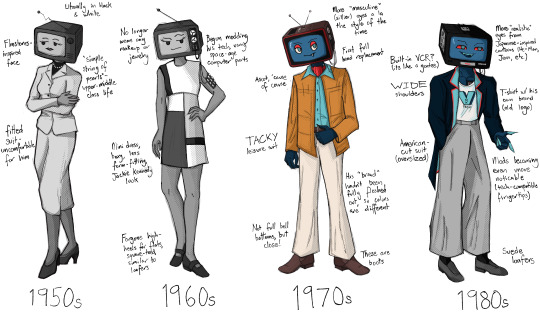
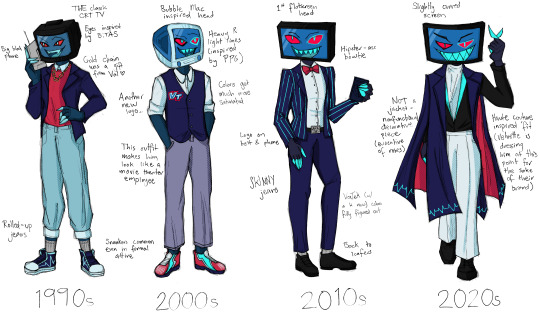
I had an idea to redesign vox because I didn't love that a character obsessed with modernization would wear a top hat and bowtie. then after a brief stint into madness where I read my partner's historic costuming textbook I drew.... all this.
(side note: the idea of vox being a trans man who transitioned AFTER death was super compelling and absolutely inspired by @prince-liest so while this is not direct fanart of their series I wanted to give a shoutout anyway!!!)
okay some TRULY unhinged rambling about historic costume below the cut YOU HAVE BEEN WARNED!
1950s: for this design I very much did not want to go to the typical a-line housewife look, because I feel that is unfitting for vox's character. instead I went for a more business look, but there is still a level of femininity that he would have been expected to perform. i wanted to express his discomfort with that through the pose and expression, though at the time he wouldn't necessarily have a framework for why he hated it
1960s: this one was very fun. i loved the idea of vox beginning to eschew some of the expected feminine presentation, and he no longer wears makeup, jewelry, or hose (though its hard to tell in black & white); however, he's kind of at war with himself in this time period. he's obsessed with seeming perfect and having a respectable image, so he would not go in for the counter-culture movements that were so big in the 60s. he's still kind of riding those coattails though, pushing those boundaries while still not acknowledging his queerness.
1970s: to me, it was very important that the gender hit as he entered the world in color. in my mind the gender euphoria is physically manifested in a wizard of oz situation - he can become who he always has been. anyway, gender aside, I think it was very important to me personally that he wore an ascot. it was for my mental health.
1980s: I wanted the 1980s to be the period where he began to gain some power and notoriety because of the de-regulation of television during this period to allow more ads, mirroring real-world history. I think if the 70s were when vox gained some real confidence, the 80s are when he got an Ego (tm). "business casual" also began to become more acceptable in this time period, and the t-shirt/suit jacket combo was very important for me to include, as to me it epitomizes the commercialism and machismo of the 80s.
1990s: this was actually the decade I was the most nervous to design, and yet I think it turned out the best? the 90s are known for grunge, which I think is NOT vox's style at all. I decided instead to lean hard into the yuppie look, which I know is more associated with the 80s but was definitely still a thing in the 90s. I also allowed a little hip-hop influence in the form of a gold chain from val, which is not something I think vox would ever pick on his own.
2000s: if the 90s were the decade I was worried about and turned out great, the 2000s are the decade I thought I had down SO GOOD and then totally floundered in execution. I still love the bubble-mac inspired head, and I tried to make his clothes as "round" as possible. I also like that this is the time where his saturation got cranked. however, I don't know if I'm in love with the vest and super bright sneakers, because again, looking back on it, he kind of looks like he works at a movie theater or best buy or some shit lol,,,
2010s: I think it's telling that this is by far the closest to his canon design (2014 tumblr lookin ass). I really wanted to pull from that hipster tech bro era, but unfortunately that aesthetic has a veneration for "retro" which again, is not fitting for vox. I still think he would wear the bowtie during this time because, well... he sure does in the show!
2020s: this was fun because I had an excuse to pull from haute couture design rather than street fashion because of the introduction of velvette into his life. I truly do not think velvette would let vox and val walk around in the outfits that they do because it would be an actual embarrassment LMAO. for this, I wanted his decorative "robes" to be evocative of the time he depicted himself as a priest AND of a cape/robe of an emperor. he does think of himself as that bitch, after all.
295 notes
·
View notes
Text
Pluto generations
Aries (1823 - 1851)
The presence of Pluto in Aries defines a generation marked by a pioneering and assertive spirit, reflecting a profound longing for independence. Those influenced by this placement often take on key roles in instigating social change and revolutionizing established systems. Historical events from 1823 to 1852, such as the Wars for Latin American Independence, the First Opium War, and the Women's Rights Convention, exemplify the transformative impact of this astrological configuration.
Taurus (1852 - 1881)
Pluto's position in Taurus defines a generation characterized by unwavering perseverance, determination, and a profound connection to the material realm. These individuals prioritize stability, security, and the sustainable use of resources, leaving a lasting imprint on economic systems and environmental consciousness. Notably, during Pluto's transit in Taurus, the Industrial Revolution surged forward, marked by the rise of corporate structures in industries like railroads and steam engines.
Gemini (1882 – 1913)
The generation under the influence of Pluto in Gemini witnessed the dawn of the Second Industrial Revolution, aptly named the Technological Revolution. These individuals, marked by intellectual curiosity and adaptability, excelled in communication and media, significantly shaping cultural and technological progress. The era marked the birth of influential figures like John Maynard Keynes and Benito Mussolini, along with German scientist Robert Koch's identification of the tuberculosis bacterium. Notably, the First World War occurred during this period, bringing significant changes in all areas of life.
Cancer (1914 -1938)
Pluto in Cancer signifies a generation characterized by deep emotional sensitivity, nurturing instincts, and strong family values. Living through World War I, the Spanish flu pandemic, and the Great Depression, they grew up in a challenging era that shaped their conservative outlook. This generation, often referred to as the "Greatest Generation," prioritized family, spirituality, and adherence to societal norms. While their emphasis on politeness and chivalry had positive aspects, it also gave rise to dark elements such as sexist gender roles, racial segregation, and cultural supremacy.
Leo (1939 – 1958)
Pluto in Leo defines a generation marked by a quest for self-expression, creativity, and a hunger for recognition. Born during historical events like the Nazi invasion of Poland and the Battle of Stalingrad, these individuals challenged authority, imprinting their influence on art, entertainment, and leadership styles. Ruled by the Sun, Pluto in Leo symbolizes a fresh start after periods of war and chaos, fostering a sense of self-value and confidence. This prideful, generous, and naturally leadership-oriented generation, however, tends to resist change and stands firm in their philosophies as a fixed sign.
Virgo (1957 – 1971)
Pluto in Virgo defines a generation marked by a robust work ethic, practicality, and an innate drive for perfection. Born during pivotal events such as the first documented AIDS cases and Martin Luther King Jr.'s iconic "I Have a Dream" speech, these individuals contribute to societal shifts in health, wellness, and environmental consciousness. Ruled by Mercury, Pluto in Virgo emphasizes efficiency and hard work, fostering reliability, trustworthiness, and empathy. This generation focuses on rebuilding and technology, epitomizing an era of research and preparation, notably during the Cold War.
Libra (1972 – 1983)
Pluto in Libra defines a generation marked by a profound yearning for harmony, justice, and equality. With Venusian qualities, these individuals are inherently social, compassionate, and value connections with others. The events during their time, such as the end of the Vietnam War, the introduction of VHS, and the rise of personal computers, align with their commitment to justice and duty for the collective. This generation, while not necessarily seeking radical societal reshaping, is more focused on preserving law and order, offering assistance to those in need, and rectifying wrongs through the pursuit of justice.
Scorpio (1984 – 1995)
Pluto in Scorpio defines a generation marked by intensity, depth, and profound transformation, playing a pivotal role in societal shifts related to power dynamics, sexuality, and psychological exploration. While the preceding Pluto in Libra generation advocated for balance, Pluto in Scorpio pushed the limits, ushering in events like the Gulf War, the end of the Cold War, and the advent of the World Wide Web. Resilient and empowered, they navigated constant transformations, developing a keen ability to adapt and thrive through each metamorphosis. This generation also contributed to a shifting cultural perspective on sexuality.
Sagittarius (1996 – 2008)
Pluto in Sagittarius shapes a generation marked by a thirst for knowledge, cultural exchange, and a global perspective, contributing significantly to societal shifts in education, philosophy, and belief systems. This generation, embodies the archer's bravery and fearlessness, fostering a spirit of rebellion and outspokenness. Sagittarius' affinity for networking and socializing with individuals from various nations aligns with the rise of the internet, a tool that facilitates global connectivity. Key events during this period include the successful cloning of Dolly the sheep, the introduction of the Euro to financial markets, and the groundbreaking launch of the iPhone in 2007.
Capricorn (2008 – 2023)
Pluto in Capricorn defines a generation marked by ambition, pragmatism, and a distinct focus on challenging traditional structures, leading to transformative changes in politics, business, and governance. Ruled by Saturn, this era, encompassing events such as the launch of Bitcoin, the Syrian civil war, Edward Snowden's revelations on mass surveillance, and the COVID-19 pandemic, unfolded amidst the Great Recession and the rise of social media. The influence of Saturn instils a commitment to rules, regulations, and social changes that align with a desire for structure and order.
Aquarius (2024 – 2044)
Pluto in Aquarius heralds a generation marked by innovation, individuality, and an impassioned pursuit of freedom and social progress. The current era unfolds amid a new global order, carrying both anticipation and uncertainty. Emerging from the constraining Capricorn era, Aquarius brings a promise of hope, healing, and a future-focused mindset.
Pisces (2044 – 2067)
Pluto in Pisces gives rise to a generation marked by empathy, spirituality, and a deepening of the collective consciousness, contributing to societal shifts in compassion, art, and transcendence. As one era concludes and another begins, this period signals the resurgence of spirituality, with people connecting profoundly to the universe through meditation and prayer. Anticipated as a peaceful time with minimal conflict, technological progress may temporarily slow after the Aquarius era's boom. This wise generation is poised to challenge traditional norms, potentially leading to the disappearance of gender roles, marking a significant chapter in human evolution.
#astro observations#astro community#astro placements#all signs#astrology#astro notes#astrologer#for you#zodiac placements#pluto#planets#predictive astrology#astrology notes
703 notes
·
View notes
Text
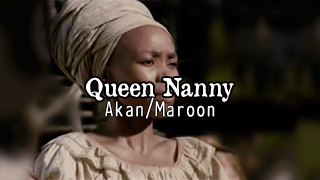


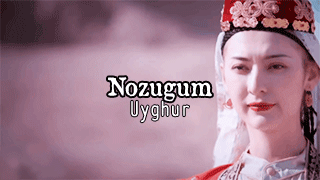

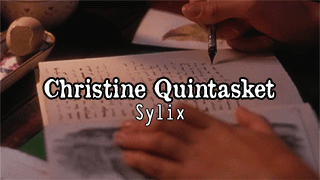

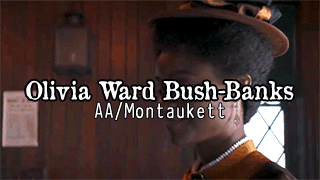
Historical Indigenous Women & Figures [6]:
Queen Nanny: the leader of the 18th century Maroon community in Jamaica, she led multiple battles in guerrilla war against the British, which included freeing slaves, and raiding plantations, and then later founding the community Nanny Town. There are multiple accounts of Queen Nanny's origins, one claiming that she was of the Akan people from Ghana and escaped slavery before starting rebellions, and others that she was a free person and moved to the Blue Mountains with a community of Taino. Regardless, Queen Nanny solidified her influence among the Indigenous People of Jamaica, and is featured on a Jamaican bank note.
Karimeh Abboud: Born in Bethlehem, Palestine, Karimeh Abboud became interested in photography in 1913 after recieving a camera for her 17th birthday from her Father. Her prestige in professional photography rapidly grew and became high demand, being described as one of the "first female photographers of the Arab World", and in 1924 she described herself as "the only National Photographer".
Georgia Harris: Born to a family of traditional Catawba potters, Harris took up pottery herself, and is credited with preserving traditional Catawba pottery methods due to refusing to use more tourist friendly forms in her work, despite the traditional method being much more labour intensive. Harris spent the rest of her life preserving and passing on the traditional ways of pottery, and was a recipient of a 1997 National Heritage Fellowship awarded by the National Endowment for the Arts, which is the highest honor in the folk and traditional arts in the United States.
Nozugum: known as a folk hero of the Uyghur people, Nozugum was a historical figure in 19th century Kashgar, who joined an uprising and killed her captor before running away. While she was eventually killed after escaping, her story remains a treasured one amongst the Uyghur.
Pampenum: a Sachem of the Wangunk people in what is now called Pennsylvania, Pampenum gained ownership of her mother's land, who had previously intended to sell it to settlers. Not sharing the same plans as her mother, Pampenum attempted to keep these lands in Native control by using the colonial court system to her advantage, including forbidding her descendants from selling the land, and naming the wife of the Mohegan sachem Mahomet I as her heir. Despite that these lands were later sold, Pampenum's efforts did not go unnoticed.
Christine Quintasket: also known as "Humishima", "Mourning Dove", Quintasket was a Sylix author who is credited as being one of the first female Native American authors to write a novel featuring a female protagonist. She used her Sylix name, Humishima, as a pen name, and was inspired to become an author after reading a racist portrayal of Native Americans, & wished to refute this derogatory portrayal. Later in life, she also became active in politics, and helped her tribe to gain money that was owed them.
Rita Pitka Blumenstein: an Alaskan Yup'ik woman who's healing career started at four years old, as she was trained in traditional healing by her grandmother, and then later she became the first certified traditional doctor in Alaska and worked for the Alaska Native Tribal Health Consortium. She later passed on her knowledge to her own daughters. February 17th is known as Rita Pitka Blumenstein day in Alaska, and in 2009 she was one of 50 women inducted into the inaugural class of the Alaska Women's Hall of Fame
Olivia Ward Bush-Banks: a mixed race woman of African American and Montaukett heritage, Banks was a well known author who was a regular contributor to the the first magazine that covered Black American culture, and wrote a column for a New York publication. She wrote of both Native American, and Black American topics and issues, and helped sculptor Richmond Barthé and writer Langston Hughes get their starts during the Harlem Renaissance. She is also credited with preserving Montaukett language and folklore due to her writing in her early career.
part [1], [2], [3], [4], [5] Transphobes & any other bigots need not reblog and are not welcome on my posts.
332 notes
·
View notes
Text
Scarlet Requiem
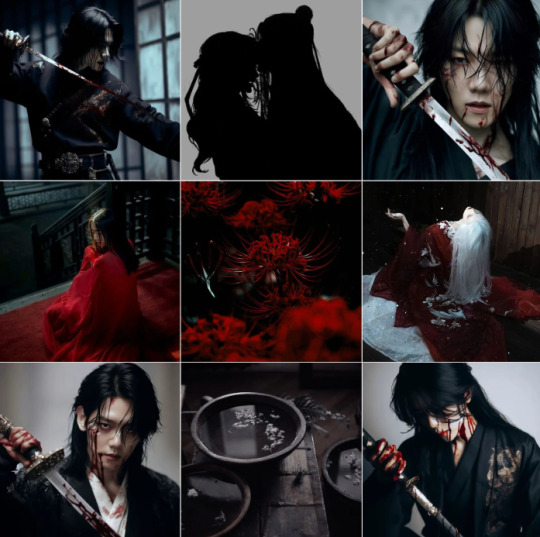

Pairing: emperor!Baekhyun x empress!reader
AU: historical au (Goryeo era)
Word Count: 4k
Summary: In his reign, Baekhyun strived to be a virtuous emperor, all for the sake of his kind-hearted empress, steadfastly resisting the temptations of power that had corrupted those before him. He held onto the belief that this was the key to securing her eternal presence by his side. Yet, he learned, to his heartbreak, that this very resolve would lead to the cruellest loss of all.
Genre: heavy angst
Trigger Warnings: major character death, violence, gore, lots of blood
MAIN MASTERLIST

"Capture that demon before she flees!"
Her hands trembled as she gazed at her reflection in the ornate gold mirror. Once healthy skin now bore a sickly pallor, brown eyes turned crimson, tears staining her cheeks red. Even her jet-black hair had transformed to snowy white. Confusion and fear gripped her as she struggled to comprehend the inexplicable transformation.
As guards roughly seized her arms, she pleaded, "No, please! I've done nothing wrong! I don't understand any of this!"
"Of course, you'd deny it, Your Imperial Majesty," sneered the Minister of Rites, one of many who had urged her husband, the emperor, to accept their daughters as concubines. "Little did you know, those potions you received from the royal healer for the past month were meant to reveal your true nature by shedding your human guise."
Horror pierced her heart as realisation dawned. The tonics meant to maintain her health had been a ruse. She had been poisoned, it explained the sudden and alarming changes in her body and health.
"You," she whispered, the weight of the truth settling heavily upon her. "It was all you."
She was not naive; she understood the ministers' discontent with her influence over Baekhyun throughout his reign. Their persistent attempts to sway him, offering their daughters as concubines to bolster their own power and threaten her position, had not escaped her notice. Their frustration must have reached its zenith when her husband adamantly refused their advances, steadfast in his commitment to her as his one and only empress.
"Hm? I'm not sure I understand what you're implying," the man smirked, his deceptive tone belying his words. "We've long suspected there was more to you, Your Imperial Majesty. It appears you're indeed a demon, effortlessly manipulating the emperor. Surely a man of his stature would desire more than one woman by his side?"
Struggling against the guards' grasp, she retorted weakly, "You vile cowards. You'll rue the day my husband learns of this..."
The pieces of the puzzle fell into place, revealing their sinister plot. They had bided their time, seizing the perfect opportunity amidst the chaos of war. With Baekhyun, the virtuous emperor she had wished him to be, leading the army, they saw their chance to poison her, framing her as a demon to eradicate her while he was away.
"Or perhaps we'll witness the rise of the ambitious emperor we've long awaited. He will finally be able to reach his full potential without you here obstructing his path," he sneered, gesturing towards the approaching healer with another bowl of poison. "Just comply and drink your tonic, Your Imperial Majesty. Your suffering will soon end, and our nation will thrive under the rule of a new emperor, liberated from your naive ideals."
As the sinister men tightened their grip, she sobbed in agony, the relentless headache from the past month resurfacing with a vengeance. Each touch felt like a dagger through her skull, each word a cruel reminder of her plight.
With an apologetic bow of his head, the healer cupped her jaw, his hands trembling as he forced the bowl of poison towards her lips. "Forgive me, Your Imperial Majesty," he whispered, his voice trembling with remorse. "This will be the last one, I promise."
She gagged as the bitter liquid slid down her throat, burning with each swallow. Crimson tears streamed down her white face as she choked on the vile concoction, feeling her strength wane with each passing moment. In that desperate moment, all she could do was pray for salvation from the nightmare consuming her.
As the healer finally released his hold, she felt despair engulf her. The bitter poison settled within her damaged insides, coursing through her veins like a silent killer, slowly consuming her from within.
"It is done, my lord. The empress will not survive through the night," the healer declared, his voice carrying a finality that chilled her to the bone.
The minister's grin widened with satisfaction. "Excellent. Arrange for someone to confirm her death by dawn. Let her enjoy her final moments in the comforts of her own chambers. His Imperial Majesty will surely be grateful we've rid him of his treacherous demon of a wife upon his return from war."
Laying limply in the centre of her grand chambers, the very space she had once despised before ascending to empress, memories flooded her mind. She recalled the scepticism that clouded her heart when she first found herself falling for the crown prince of the nation. After all, history had taught her that no happy endings awaited the women who loved emperors. But Baekhyun was different—he was loving, caring, and considerate, going to great lengths to prove his devotion to her.
He swore never to take concubines, to resist the allure of power, and to remain hers, and hers alone. Despite the admiration of the entire nation, he remained committed to prioritising her above all else, even if it meant drawing the ire of his ministers and officials. Their accusations of his partiality towards his empress over his nation only served to strengthen his resolve, his unwavering loyalty to her.
But now, as she lay weakened by poison, she realised the tragic irony of his goodness. It was his very commitment to righteousness that led him to the battlefield, refusing to let his men fight in his stead. And it was this decision that ultimately sealed their fate, leaving her to face the consequences of his noble intentions.
As the darkness closed in around her, she couldn't help but wonder how Baekhyun would react upon returning to find her lifeless form in this state. Would he succumb to the poisonous words of his ministers, believing their accusations that she had been a demon all along? Would he entertain the notion that she had bewitched him, clouding his judgement and leading him astray?
Or would he remain firm in his loyalty, unwavering in his belief that this was nothing more than a cruel ploy to rid him of her for good? In the depths of her fading consciousness, she desperately clung to the hope that he would see through the lies, that his love for her would prevail over doubt.
On the brink of death, she yearned to trust in his endless devotion to her, to believe that he would never doubt the love they shared. It was a fragile hope, but in that moment, it was all she had to cling to as she slipped further into the darkness, awaiting the inevitable arrival of dawn and the fate it would eventually bring.
"Forgive me for not being strong enough, Baek," she whispered into the stillness of the chamber, her voice barely a breath against the heavy silence. "Please don't blame yourself for any of this."
As the darkness threatened to swallow her entirely, she couldn't help but reflect on the warnings of history, the cautionary tales of women who loved emperors, only to meet tragic ends. Once again, it seemed, she had fallen victim to the same fate.
Her vision blurred with crimson tears as memories flooded her mind—moments shared with Baekhyun before he departed for battle, blissfully unaware that they would be their last. Each memory stung with bittersweet intensity, a painful reminder of what could have been, had fate been kinder.
As her life ebbed away, flashes of cherished moments with him flickered through her mind like scattered stars in the night sky.
Wrapped in the warmth of silk sheets, doubts clouded her mind one morning, questioning her husband's resolve to remain faithful amidst the pressures of his position.
"Would you truly refuse to take any concubines, Baek?" she inquired, her voice laced with uncertainty. "You're aware that the ministers and officials desire it, and perhaps even the citizens of our nation. For all we know, the people might have grown weary of this same dull empress who has yet to bear you an heir."
He drew her close, pulling the silk sheets higher to shield her bare form from the chill seeping through the open windows. Pressing a tender kiss upon her head, he smiled reassuringly. "Never, my love. I do not care for their political machinations. I won't forsake my vow to you. You will remain my only wife, that is final. I did not ask to be emperor, the role was thrust upon me. Now that I am here, they should at least be grateful I am fulfilling my general duties."
She chuckled, nestling into the crook of his neck as he added, "Besides, if the ministers and officials are so displeased, they could just dismiss me. That would be even better; we could live in a quiet little village, just as we've always dreamed."
In another memory, standing before her reflection, plagued by insecurities instilled by the scheming ministers, his unwavering admiration melted her fears away.
"You look beautiful, my empress. You always do," he reassured, approaching from behind to envelop her in his arms.
"Not as beautiful as those young maidens, I fear. I am old," she confessed, feeling a twinge of self-consciousness after witnessing the ministers' attempts to seduce the emperor with their daughters.
Baekhyun gently turned her to face him. "If you're old, then I must be ancient," he teased. "I believe it's only fitting that I am with someone my age, and that's you, my empress. I have no interest in marrying children or anyone else for that matter; I am a taken man. Don't you dare compare yourself to anyone else again, you hear me? You're the most beautiful woman in my eyes, and that's all that matters."
In the final embrace before he departed for war, hearts heavy with the uncertainty of his return, they clung to each other.
"I will be back before you know it, my love. You'll wait for me, won't you?" her husband murmured against her neck, his arms tightening around her.
"Where else would I go, you idiot? Of course, I'll be waiting right here," she retorted, tightening her hold around his shoulders.
Amidst tears and laughter, he leaned in to kiss her deeply, pressing his lips against her soft ones over and over again to imprint the sensation into memory.
"I love you, my empress," Baekhyun whispered against her lips before pulling away, his eyes full of love and determination.
In the quiet of her chamber, she found solace in the fleeting recollections, clinging to them as the darkness threatened to consume her entirely. And as the crimson tears clouded her eyes once more, she resigned herself to the inevitable, silently bidding farewell to the life she once knew.
"I love you too, my emperor."
"I will not ask again, where is she?!" the emperor's voice thundered through the throne room as he stormed back into the palace, abandoning the battle upon learning the shocking revelation. According to the Minister of Rites in his letter, the empress had been discovered to be a demon all along, concealing her true nature under human skin to manipulate him and bend him to her will.
The eunuch panicked and fell to his knees. "Th-the empress is confined to her grand chambers, Your Imperial Majesty!"
Without uttering another word, Baekhyun stormed over immediately, his heart thumping loudly against his chest as fury overtook his being. Betrayal flooded his veins; he was seething with anger.
"You will regret lying to me," he growled under his breath, his vision zeroing in on the path towards her chambers, the place he frequented more than his own. "You will regret deceiving me."
Upon reaching the entrance of her chambers, he turned to the eunuch. "Gather all the ministers and officials who played a part in discovering the empress as what they claimed her to be in the throne room. I wish to speak with them soon."
"Yes, Your Imperial Majesty," the eunuch hurriedly replied before darting off to carry out his orders. Baekhyun steadied his breaths, his hand resting on the door as he prepared to face her once more. Under his breath, he vowed, "I swear, you will all regret it. How dare you accuse my wife of being what you are—demons."
I'm here now, my love.
Stepping into the familiar room, the emperor's heart raced with anxiety as he mulled over a perfect apology. He needed to express his deep remorse for not being there when she needed him the most, for failing to shield her from the treachery of those vultures. Reflecting on his actions, he realised he should have never left her behind. In his rush to leave for war, he had neglected to arrange proper protection for her. In hindsight, he understood that he should have never left her side in the first place.
Determined to make amends, he vowed to do better. He resolved to never again allow those ministers or officials the opportunity to torment her in his absence again. From now on, he would be her shield, her staunch protector, and her unending support.
But it might be too late for any of that.
His steps faltered, his breath caught in his chest, and his heart skipped a beat as he beheld the sight before his eyes. The sword in his hands slipped, clanging loudly as it hit the ground, and he sank to his knees in disbelief at the last thing he expected to see.
His shock deepened as he took in his wife's unrecognisable appearance. Crawling towards her limp form on the ground, he pulled her into his arms, his voice trembling with anguish. The horror settled within him like a heavy weight as he tried to imagine what atrocities these monsters had dared inflict upon her while he was gone. His mind raced with images of torture and torment, each one more gruesome than the last.
"Oh god, what have they done to you?" he whispered, his heart fracturing into a million shards as he struggled to comprehend her pale skin, her white hair, and the blood-like tears staining her cheeks. With shaking hands, he gently cupped her cold cheek, his fingers tracing the contours of her face as if seeking reassurance that she was still there, still his beloved wife.
"Please wake up, my love. This isn't funny, stop scaring me," he pleaded, his voice thick with emotion. "You promised to wait for me. You promised..." His words trailed off into a broken sob as he refused to accept anything but the truth, shaking his head in denial even as he searched desperately for a pulse, even when she remained unresponsive.
"No, no, no... this can't be real. It can't be," he murmured, his mind reeling with the unimaginable horror of what he had found.
Despair and regret enveloped him as he sobbed painfully, holding her lifeless body tightly against his chest. The realisation that she was truly gone, that her final moments were spent alone in the very room she despised just to be with him, weighed heavily on his heart. He grappled with the bitter truth that he had failed her, just as she had feared when she hesitated to be with him.
Gradually, his sorrow gave way to seething rage as he recalled the faces of the ministers and officials responsible for this atrocity. They had callously taken her life, foolishly believing he would be deceived by their feeble attempt to frame her. With trembling hands, he picked up a shard of the shattered bowl nearby and brought it to his nose, recognising the metallic scent of mercury.
Suddenly, everything clicked into place.
They had poisoned her with lethal doses of mercury, causing a myriad of symptoms—tremors, headaches, muscle weakness, kidney damage, and breathing difficulties. And the deliberate administration of such high doses to turn her hair white revealed their sinister intent from the outset.
Just how much had they fed her? It was evident they had intended to kill her from the start. Anguish and fury surged within him as he vowed to make them pay.
Gently caressing her cold cheek, he leaned in to kiss her unmoving lips, his own trembling against hers. He blamed himself for everything that had transpired. Perhaps if she hadn't been with him, she would have lived a better life—a normal life with a normal man. She wouldn't have to endure such a painful and cruel death.
It was all because of him.
Regret hung heavy in his heart, but dwelling on what could have been served no purpose.
"I'm so sorry, my wife," he whispered, his voice thick with grief. "Just hold on a bit longer, alright? I'll join you soon, but first, I'll make those bastards pay. Wait for me—I won't let you face this alone. Not again."
With resolve hardening in his heart, he retrieved his sword and sheathed it once more before lifting her lifeless form into his arms. Like a man burdened by death itself, he trudged towards the throne room where justice awaited. Kicking the doors open with a forceful thrust of his leg, he was met with a sea of horrified expressions from the ministers and officials. Clearly, they hadn't anticipated the emperor's dramatic entrance, cradling his beloved empress in his arms.
Ignoring their shocked gazes, he strode past them, his eyes fixed on the throne at the far end of the room. With careful tenderness, he laid his wife down upon the ornate seat, arranging her robes and ensuring her comfort as though she were merely sleeping. Pressing a solemn kiss upon her cold forehead, he turned to face the assembled council, their unease palpable in the air.
The guilty culprits remained frozen in their places, uncertain of what awaited them.
As the emperor's gaze swept over them, the ministers and officials for the first time felt a cold shiver of fear trickle down their spines. His expression was unreadable, his appearance wild and dishevelled compared to his usual polished demeanour. Specks of blood and dirt stained his robes and skin, his hair a tangled mess, half tied up in a disarray that mirrored the chaos within him.
Gone was the warm smile that often graced his features; instead, a slow, unsettling grin crept across his face.
"My dearest ministers and officials," he began, his voice low and laced with an eerie calmness. "Your message has been received loud and clear. I hope you're satisfied now that you've succeeded in eradicating the empress, as you so desperately desired. I've given it some thought, and perhaps... you were all right."
The Minister of Rites, attempting to feign nonchalance, cleared his throat. "A-about what, Your Imperial Majesty?" he stammered.
Baekhyun's eyes gleamed with a frightening intensity as he smirked, his demeanour bordering on madness. "About what this nation truly needs," he replied, his voice carrying a chilling edge.
"Not a good emperor, but a mad one."
Without giving the men before him time to register his words, all Baekhyun saw was red. In a split second, he unsheathed his sword and transformed into a bloodthirsty animal, cutting down anyone and everyone in his path. The Minister of Rites tried to flee but to no avail. He watched in complete horror as his colleagues dropped dead one by one, their blood splattering over the grand walls of the throne room, their screams echoing.
The emperor went on a rampage, leaving no man behind. The Minister of Rites, who had been behind the idea of poisoning the empress, smearing her name by labelling her a demon, and executing her, was now filled with regret. They had turned him into the mad king his empress had feared. Perhaps they had finally achieved their goal, but it wasn't what they were prepared for.
The minister collapsed to his knees before the emperor, realising that His Imperial Majesty had saved him for last. Trembling, he rubbed his hands together in a desperate plea. "P-please, everything I've done, it's for the betterment of our nation."
Baekhyun's humourless laughter echoed through the hall, sending shivers down the minister's spine. "You truly believe that, don't you? Of course, that includes subjecting my wife to all that torment. Yes, because that is exactly what the nation needs. Unfortunately for you, I am the emperor, and I determine what's best for the nation. And in this case, I think it's better off without traitors like you. See you on the other side," were the last words the minister heard before his head was severed from his neck, rolling off to join the others on the floor.
The emperor finally turned back, his eyes softening as they landed on his beloved's lifeless body. Making his way back towards her, he knelt down beside her, tears streaming down his face as he reached for her hand. Holding it to his cheek, he missed the warmth it once had.
"I'm coming now, my love," he whispered brokenly. "I'm sorry you had to wait for so long. I'll be there with you soon."
"Yes, I understand His Imperial Majesty's orders not to enter, but it's been hours. Surely, any assembly would have concluded by now, wouldn't it?" With apprehension and curiosity, a senior court lady pushed open the doors to the once-bustling throne room, expecting to find His Imperial Majesty and his council of ministers. Instead, she was met with a horrifying sight—a scene of bloodshed and chaos spread across the grand hall.
Her piercing scream echoed through the silent room, jolting nearby palace staff into action. Rushing to the scene, they were met with a scene that chilled them to the bone. At the end of the room, amidst a sea of lifeless bodies, lay the empress on the throne, her appearance shocking all who beheld it. Beside her, her husband remained, his head cradled on her chest, their hands tightly clasped together. A gaping stab wound marred his chest—it seemed he had taken his own life before joining her in death.
Following that, the next prince in line promptly ascended the throne and found himself compelled to appoint an entirely new cabinet of ministers and officials. The entire nation descended into chaos, particularly since it was still embroiled in a war, with endless theories circulating about the events. While some speculated that the emperor succumbed to madness and killed his own council, others whispered of a conspiracy, suggesting that the ministers had orchestrated the demise of both the empress and the emperor.
Amidst this uncertainty, the new prince faced the daunting challenge of restoring order to the kingdom. With a heavy heart, he pledged to uncover the truth behind the tragic occurrences and ensure that justice was served to those responsible.
In the end, the truth of what truly occurred remained shrouded in mystery. All those involved had departed from the realm of the living. As centuries passed, that chapter in history became known as the Scarlet Requiem, a haunting tale that lingered in the collective memory of the kingdom. Despite countless efforts to unravel the enigma, the events surrounding the tragedy remained obscured by the sands of time, leaving future generations to ponder and speculate about the dark secrets of the past.
"What do you think really happened?" a woman asked her boyfriend as they studied a painting depicting the throne room scene in a museum dedicated to the events of the Scarlet Requiem.
He pondered for a moment before responding with a shrug. "It's hard to say. But judging by the way he's holding onto her, it seems he must have truly loved her. Let's hope they've found peace and happiness, whether in the afterlife or their next life."
She nodded in agreement, leaning into his comforting embrace. "Yeah, I hope so too."
He flashed a mischievous grin. "I'm just saying, if I were him, I wouldn't have left her for war in the first place."
She rolled her eyes and gave him a playful smack, though a smile danced on her lips. "I'm sure you wouldn't. I bet it's because the empress was described as beautiful as a celestial being."
He scoffed. "Doesn't matter to me how pretty she was. I'll stay only if you're my empress."
Unbeknownst to them, the couple had been contemplating their own past lives. Perhaps the emperor and empress had indeed found each other again in another existence.

Believe it or not, this has been on my mind for months ever since seeing those AI-generated photos of Baekhyun. I had an epiphany while looking at them again yesterday and just had to write this. It's my first EXO fic, and I hope it's decent hehe~
As always, thank you for reading and let me know your thoughts! <3
Master Tag list:
@the-kpop-simp @itstheghostofmypast @green-agent @vantediary @tinyteezer |
@hollxe1 @pandabur666 @lilactangerine @oddracha @evidive

All Rights Reserved © edenesth // DO NOT REPOST, TRANSLATE, PLAGIARISE OR REPURPOSE.
#edenesth#exo#exo fanfic#exo fanfiction#byun baekhyun#exo baekhyun#historical au#goryeo dynasty#baekhyun x reader#exo fic#baekhyun oneshot#exo oneshot#kpop angst#exo angst#baekhyun fanfic#baekhyun angst
237 notes
·
View notes
Note
how do you think jaemin would treat their partner?
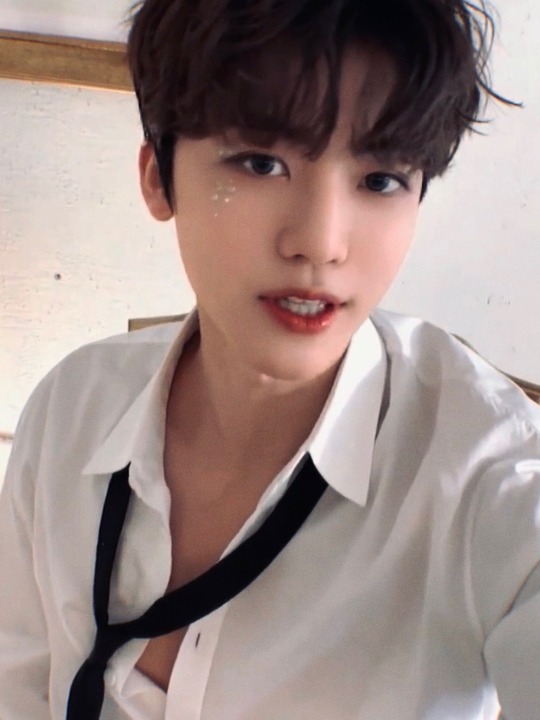
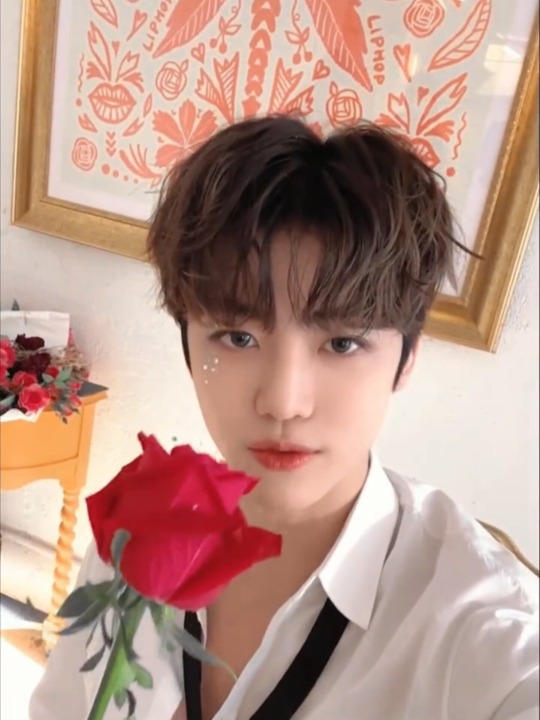

WHERE DO I BEGIN (also perfect timing because these photos dropped and its all i can think about ㅠㅠ)
☆ na jaemin would be THE BEST partner ever i know it, i can count on it! [AHHHH] he’s just so thoughtful and caring and really thinks before he does.
i feel like if he saw you asleep on the couch he would most definitely make sure a blanket is over you and have a water on the table waiting for when you wake up.
he would have so many pet names for you princess/prince being his favorite one to call you of course.
i think while out shopping he would pay for all of your purchases and would not allow you to hold any of the bags. i feel like too that after each time he swipes his card he would look at you and kiss you on the cheeks because its what you deserve.
when you two are in bed together he pulls you into him, close to his warm chest (your favorite place for your head to rest) he runs his fingers through your hair as the two of you talk about whatever is on the both of your minds drifting off to sleep.
would be very cautious of your health, and making sure you take your probiotics and vitamins— making sure you are staying warm during the winter and hydrated during the summer
always letting you rest your head on his shoulder
always taking your side when you’ve had a bad day
picking you up from the train station after you get out of work because hates the idea of you walking anywhere alone. and if he cant make it he will make sure you face-time/call him during the walk.
you sit in his lap all the time even in-front of all the other members. instead of kissing or hugging this is how you guys show off to them.
would take you on trips, and on them you guys would go to coffee shops, museums, historic places. but he will have his camera out pointed at you (l feel like he would want to be one of those aesthetic couple influencers on instagram)
mdi
i feel like while having sex with him (and not to popular belief), he would take in every moment and be gentle to make sure you feel good too.
i kinda feel like if you tell him you are going out with your friends and he sees you dressed sexy he would fuck you right then and there before you are aloud to leave, not out of jealousy but just because of how good you look.
would love morning sex because it means he gets to see you with the sun rays hitting all the right places.
i also feel like he is so open to trying new things in bed that are either proposed by jaemin or you. (i know this is contradicting what i just said but i know he’s a freak in the sheets sometimes to spice things up)
AFTERCARE !!!!! is HIS THING! i feel like he would be so caring ask you if what he did just moments ago was good and if there is anything he need to change. getting you water but making sure you go to the restroom and take a shower (sometimes he will join, sometimes for a second round and sometimes just to make sure you don’t fall over) then tucking you in as you fall fast asleep.
— over all i think he would be such a WONDERFUL partner like i feel it in my bones every time i look at this man he would treat you so well. he just makes it easy to think this with all the bubble messages (almost every day) that nctzens receive saying “you did a good job today, sleep well and stay warm” YEAH also him putting money aside for a 401k and pension plan is so fucking hot 🤕 its the little things he does that makes it so easy for me to invision all of this.
sorry for this long post hopefully this answers the question
please feel free to leave something in my ask
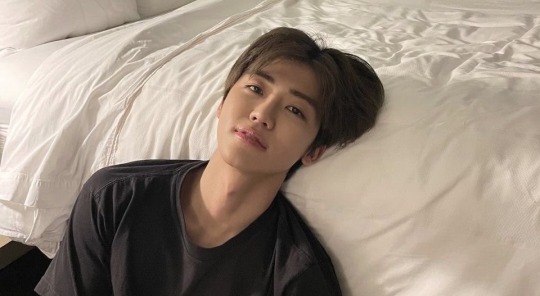
#najenvhs—ask♡#nct dream#nct headcanons#nct smut#nct imagines#nct drabbles#nct dream imagines#na jaemin#nct scenarios
220 notes
·
View notes
Text
what's a dna (asteroid 55555) persona? what can a dna persona chart show you?
hypothetically, your dna chart can tell you more about the genetic predisposition of your health, what genetic diseases and mutations you are at risk for, your ancestry, and your genetic traits.
mini disclaimer: genetic/ethnicity/ancestry can be a delicate subject for a lot of people - this is is topical post about what the planets and houses could mean. i am not a doctor or geneticist - this chart can not be used to diagnose health issues/problems or anything else with 100% accuracy.
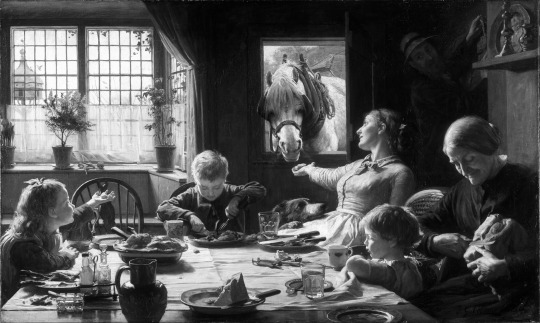
sun
your genetic identity, your projected vitality, genetic predispositions you should pay attention to, genetic prominence, genetic connects to royal/famous/infamous individuals, and/or how your genetics are different from your ancestors / what makes you an individual (not a clone - or perhaps different from a twin)
moon
what you inherited from your mother, your family's heritage, how your ancestors have adapt/evolved to make you who you are today, neanderthal ancestry ratios, hereditary menstrual issues, genetic fertility factors, and/or the brca / pcos / uterine fibroids gene
mercury
genetic mental health conditions, neurological conditions/diseases, taste/smell/hearing, how you can change your genetic "fate," what genetics can be forgot, aptitude to speak the languages of your ancestors, and/or how your daily routine affects your genetics (nature versus nurture)
venus
genetic attraction / who you attract to create viable offspring that is meant to survive, your genetic beauty, your ability to preform self love (aka your ability to cope with hereditary depression and anxiety), genetic hair type, genetic femininity (xx, x0, xxx, etc), genetics you share with a majority of your family, values and festivities with have due to heritage, genetics diabetes, genetic cheerfulness versus depression, and/or pcos gene
mar
genetic confidence in public speaking, competitiveness that makes your genes superior to past generations, genetic athleticism / muscle composition, genetic masculinity (xy, xxy, etc), genetic dominance, and/or prone to violence (neanderthal influence)
jupiter
where you are lucky in the genetic lottery, where you have an abundance of genetic information, where are successful in breaking genetic trends, your opportunity to beat the genetic odds, your knowledge of your genetic makeup, genetic blessings, where you can afford to be optimistic about your health, and/or genetic predisposition to macular degeneration
saturn
what you should work hard to be your genetic makeup, genetic health challenges, what you inherited from your father, genetics fears/anxieties, how long you can live if you are healthy, your genetic limitations, ancestry, genetic deficiencies, and/or the effort you make to beat your genetics
uranus
genetics of social anxiety, sudden changes historical genetics - where you are the first in your family diagnosed with a genetic mutation/disorder, what makes you genetically unique, and/or shocking/unexpected ancestry/origin
neptune
genetic alcoholism/escapism, hidden genetic knowledge or ancestry, delusions surrounding your heritage, disappearance of heritage, and/or the fascination you have with your ancestry and genetic
pluto
genetic transformation, the power in your genes, genetic sex, destructive genes, you genetic projected death, regenerative genes, your obsession with your genetics and heritage, and/or your genetic evolution
1h
genetic identity/self, outward physical traits / appearance, physical body, physical genetic build, genetic individuality, and/or passion for genetics
2h
genetic wealth, effort you put in to beat your genetics, genetic material, values surrounding your heritage, genetic stability, giving/receiving your heritage, and resources surrounding your genetics
3h
how your genetics are communicated, genetic mental health issues and disabilities, your opinions about your heritage, how you can consciously fight your genetics, genetic relationship with your siblings, interest in your heritage and genetics, and/or information you have on your ancestry and genetics
4h
genetic/familial origins and roots, your parents genetics, how you were treated in childhood based on your genetics, heredity traits, traditions you upload because of your heritage, and/or genetic femininity
5h
your children's genetics, creative methods of celebrating your heritage, who you are attracted to based on genetics/ethnicity, vacations you take to reconnect with your heritage/ethnicity, hobbies/festivities/traditions that are related to your ethnicity, and/or genetic fertility (pcos, fibroids, etc)
6h
how your daily routine is affecting your genetics or rather triggering your genetics, your genetic health, how fitness/hygiene/medication/diet can benefit for life expectancy because of genetic factors, the self improvement you do to fight genetic pre-destiny, how consistency aids/harms your health, how you help others to better understand their origin, and/or genetic analytics
7h
your significant others' ethnicity/heritage, genetic attraction, genetic attractiveness, contracts with genetic storage banks (for instance mine is in a 23&me storage data bank), how others treat you based on your genetics, and/or genetics share with those in your family
8h
dna mutations, projected longevity based on your genetic makeup, changes you should make to live longer, how much time invest into getting to know more about your genetics and heritage, what you inherited from your ancestors genetically, genetic reproductive rates, assets of your ethnicity, secrets about your ethnicity, the spiritual transformation that occurs when you learn more about your heritage/roots, and/or trauma related to race/ethnicity/heritage
9h
beliefs/religion/ideologies associated with your roots, what can learn about your heritage/ethnicity, languages associated with your roots, where your ancestors immigrated or where they emigrated from, genetic ethics, and/or what you can learn about your ancestors
10h
your genetic legacy/offspring, what the world believes your origins are, how you can beat genetics, long-term health goals you may have, what you inherit from your father, and/or genetic experts in your life
11h
what you gain from having knowledge of your ancestors, genetics you share with a half sibling, what makes you genetically unique, how technology can help you learn more about your genetic background, social awareness you have others ethnicities/culture/heritages, and/or how your genes manifest
12h
how you can heal using your genetic information, the hidden features of your genetic code, your projected age, how well you sleep based on your genetics, mental health issues you have a predisposition to, genetic fears you have in place so that you can survive, what you don't know about your genetics, and/or how you should restrict yourself to promote longevity/vitality
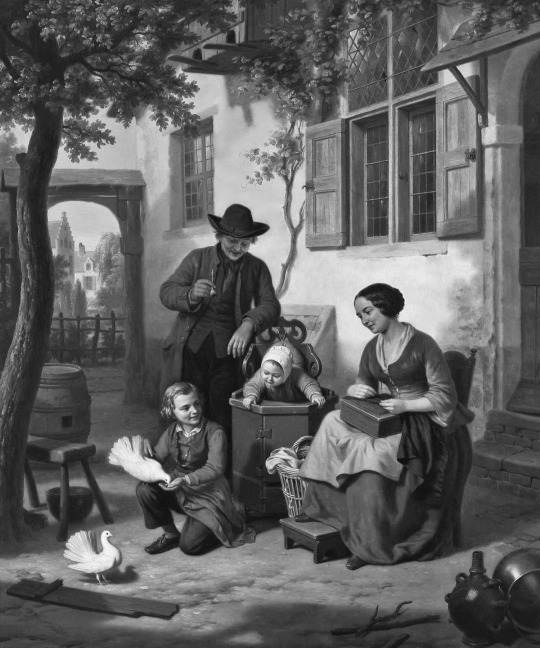
like what you read? leave a tip and state what post it is for! please use my "suggest a post topic" button if you want to see a specific post or mythical asteroid next!
click here for the masterlist
click here for more asteroids that aren't getting more attention than this
want a personal reading? click here to check out my reading options and prices!
© a-d-nox 2023 all rights reserved
#astrology#astro community#astro placements#astro chart#asteroid astrology#asteroid#natal chart#persona chart#astrology tumblr#astronotes#astrology readings#astro notes#natal astrology#astro observations#astroblr#asteroid55555#dna#asteroid dna
245 notes
·
View notes
Text
[Hanfu · 漢服]Chinese Warring States period(475–221 BC) Traditional Clothing Hanfu-Life of Qu Yuan(屈原)
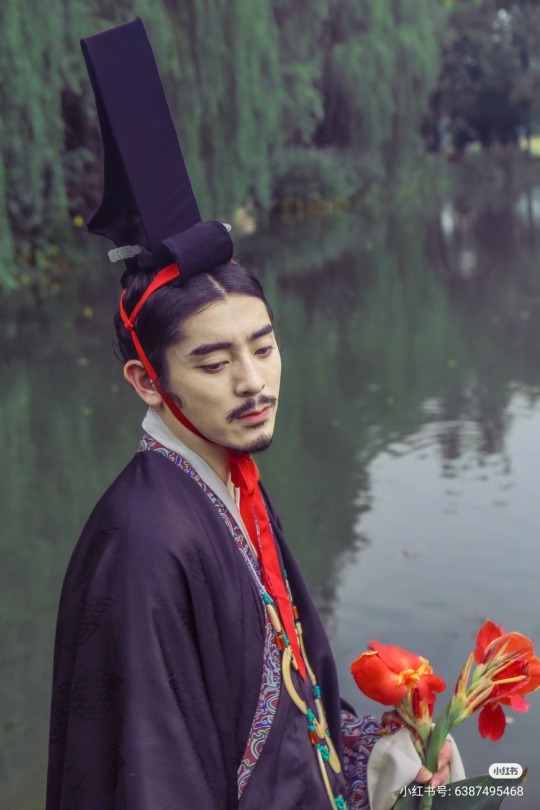
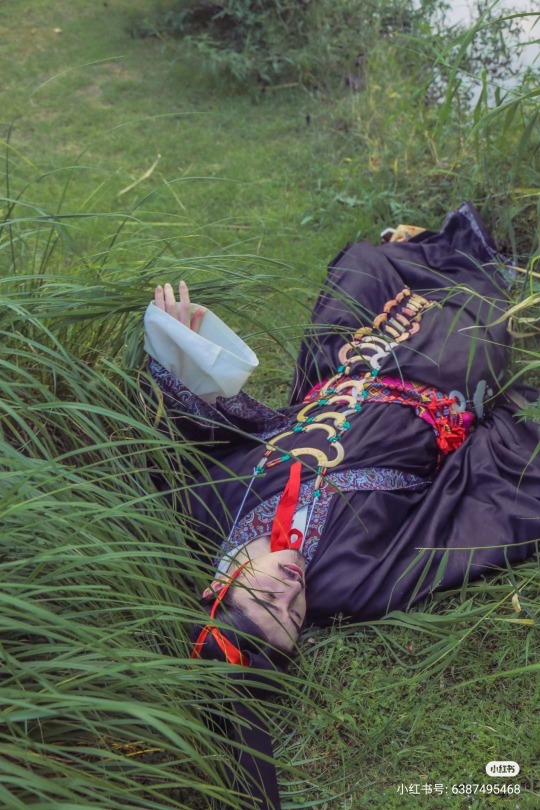
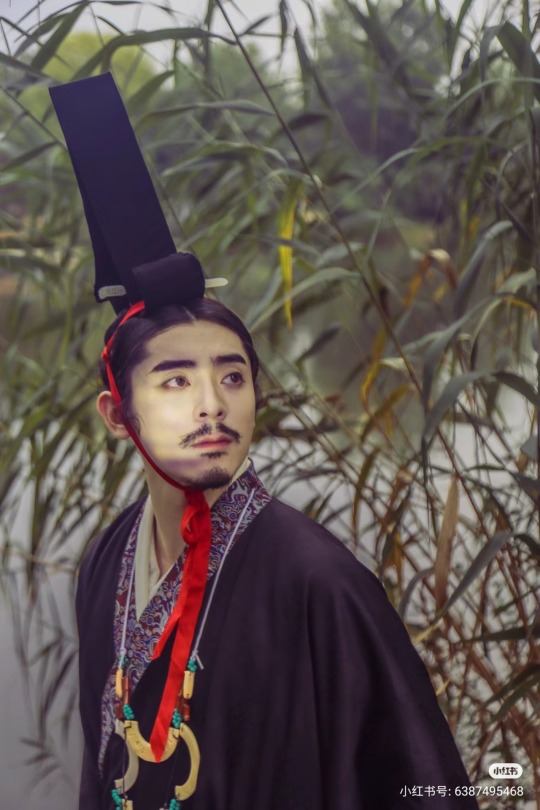
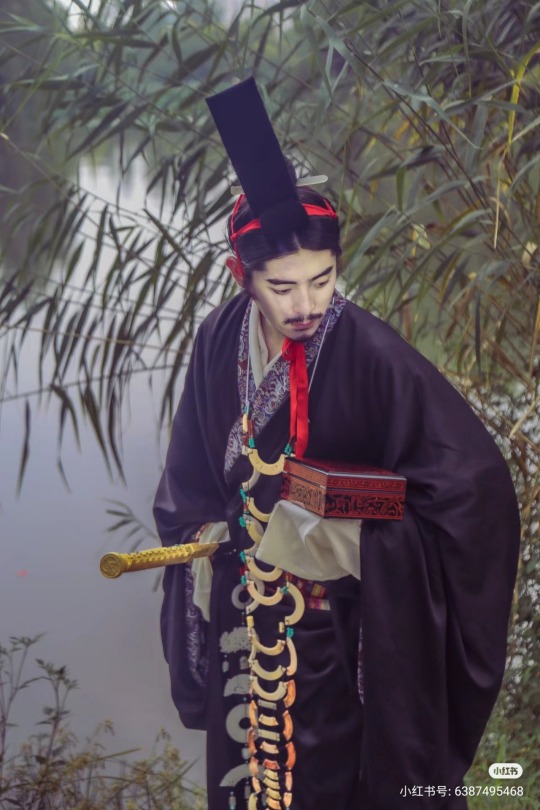
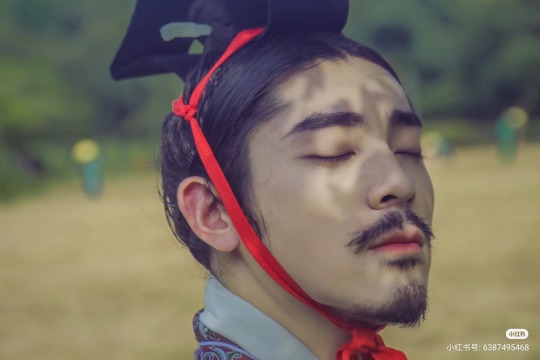
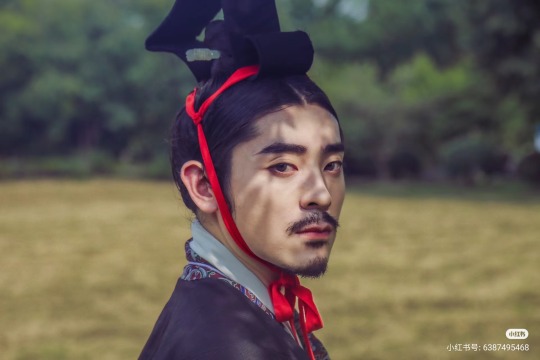
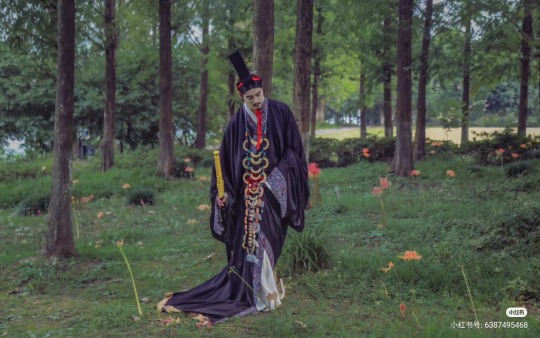
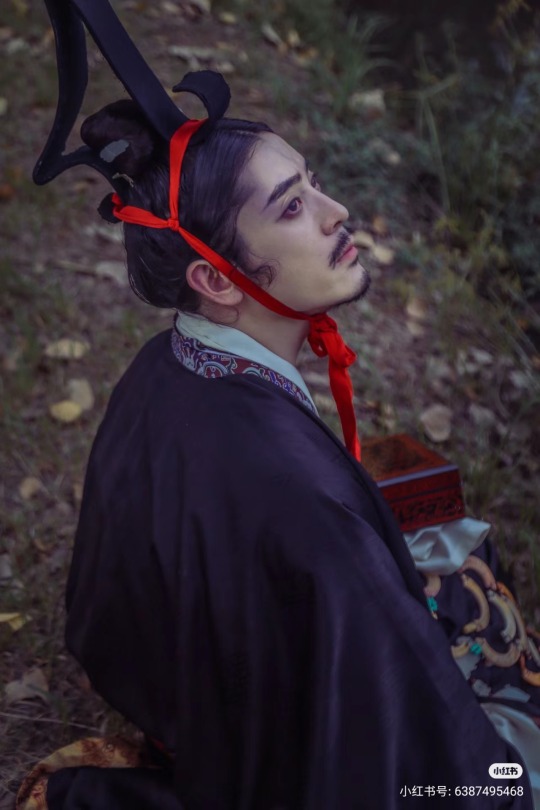
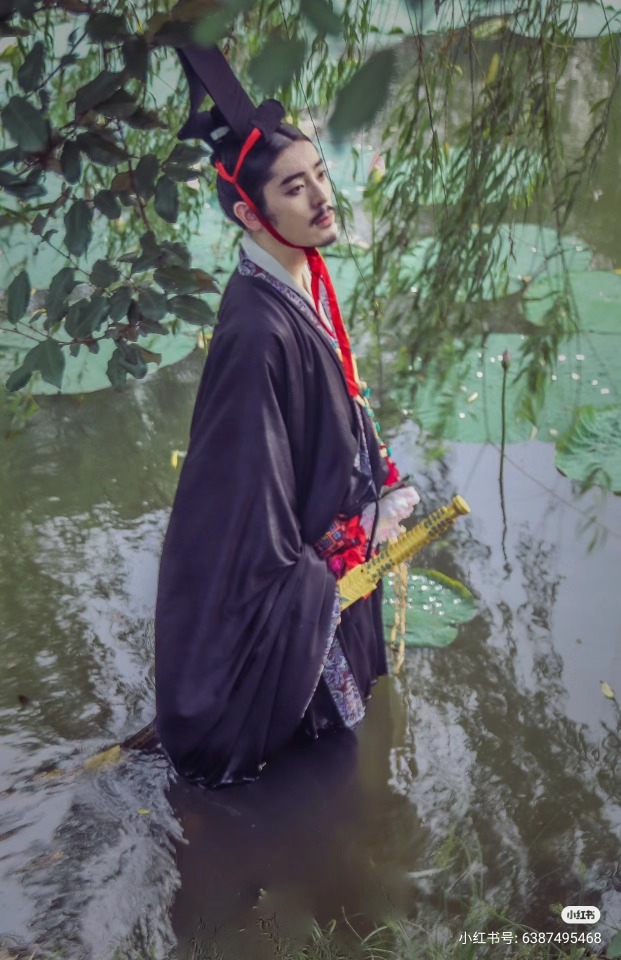
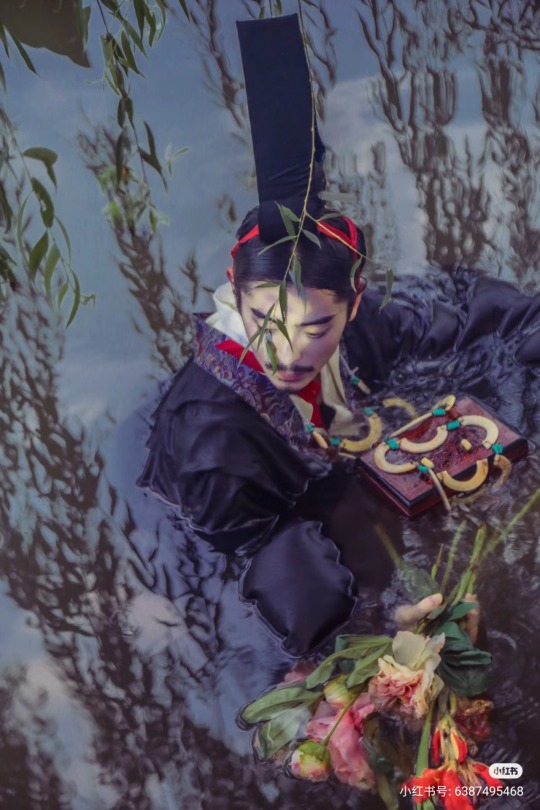
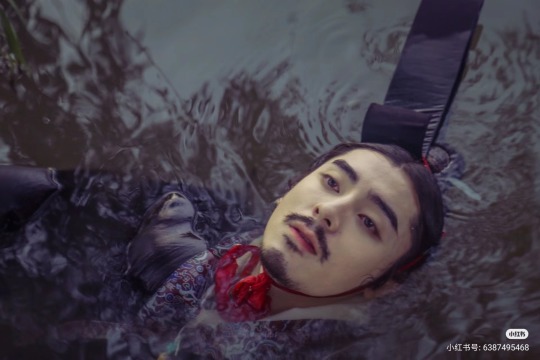
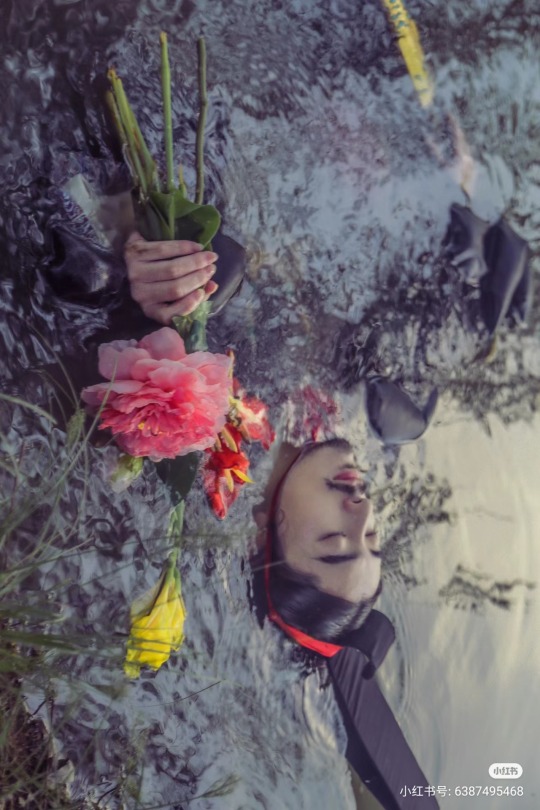
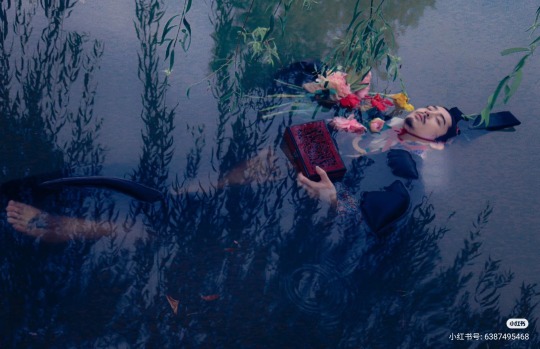
【Historical Artifact Reference】:
China Warring States period (475-221 BC):Silk painting depicting a man riding a dragon (人物御龍帛畫)
it was discovered in the Zidanku Tomb no. 1 in Changsha, Hunan Province in 1973. Now in the Hunan Museum
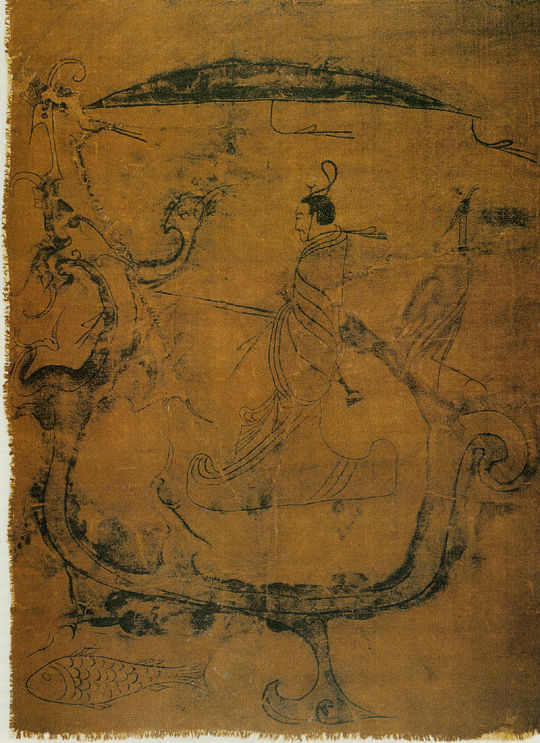
A man with a sword is riding a dragon by holding the rein. The dragon's body was given the shape of a boat. A little egret is standing at the tail of the dragon. A carp under the dragon is leading the way. The umbrella in the top middle of the picture shows the owner's nobility. The work has become associated with the Chu poet Qu Yuan’s famous verse from his poem Shejiang (涉江, Setting foot in the river), ‘Carrying a long sword with weird colour; Wearing a qieyun–styled high cap.” (帶長鋏之陸離兮, 冠切雲之崔嵬)
Western Zhou Dynasty seven-huang jade pendant with linked beads/西周七璜联珠组玉佩

About Qu Yuan(屈原)
Qu Yuan (c. 340 BC – 278 BC)was a Chinese poet and aristocrat in the State of Chu during the Warring States period. He is known for his patriotism and contributions to classical poetry and verses, especially through the poems of the Chu Ci anthology (also known as The Songs of the South or Songs of Chu): a volume of poems attributed to or considered to be inspired by his verse writing. Together with the Shi Jing, the Chu Ci is one of the two greatest collections of ancient Chinese verse. He is also remembered in connection to the supposed origin of the Dragon Boat Festival.
Historical details about Qu Yuan's life are few, and his authorship of many Chu Ci poems has been questioned at length.[4] However, he is widely accepted to have written "The Lament," a Chu Ci poem. The first known reference to Qu Yuan appears in a poem written in 174 BC by Jia Yi, an official from Luoyang who was slandered by jealous officials and banished to Changsha by Emperor Wen of Han. While traveling, he wrote a poem describing the similar fate of a previous "Qu Yuan."Eighty years later, the first known biography of Qu Yuan's life appeared in Han dynasty historian Sima Qian's Records of the Grand Historian, though it contains a number of contradictory details.
Life of Qu Yuan(屈原)
The only surviving source of information on Qu Yuan's life is Sima Qian's biography of him in Records of the Grand Historian (Shiji), although the biography is circumstantial and probably influenced greatly by Sima's own identification with Qu.Sima wrote that Qu was a member of the Chu royal clan and served as an official under King Huai of Chu (reigned 328–299 BC).
During the early days of King Huai's reign, Qu Yuan was serving the State of Chu as its Left Minister. However, King Huai exiled Qu Yuan to the region north of the Han River, because corrupt ministers slandered him and influenced the king.Eventually, Qu Yuan was reinstated and sent on a diplomatic mission to the State of Qi. He tried to resume relations between Chu and Qi, which King Huai had broken under the false pretense of King Hui of Qin to cede territory near Shangyu.
During King Qingxiang's reign, Prime Minister Zilan slandered Qu Yuan.[9] This caused Qu Yuan's exile to the regions south of the Yangtze River. It is said that Qu Yuan returned first to his home town. In his exile, he spent much of this time collecting legends and rearranging folk odes while traveling the countryside. Furthermore, he wrote some of the greatest poetry in Chinese literature and expressed deep concerns about his state. According to legend, his anxiety brought him to an increasingly troubled state of health. During his depression, he would often take walks near a certain well to look upon his thin and gaunt reflection in the water. This well became known as the "Face Reflection Well." On a hillside in Xiangluping (at present-day Zigui County, Hubei Province), there is a well that is considered to be the original well from the time of Qu Yuan.
In 278 BC, learning of the capture of his country's capital, Ying, by General Bai Qi of the state of Qin, Qu Yuan is said to have collected folktales and written the lengthy poem of lamentation called "Lament for Ying". Eventually, he committed suicide by wading into the Miluo River in today's Hunan Province while holding a rock. The reason why he took his life remained controversial and was argued by Chinese scholars for centuries. Typical explanations including martyrdom for his deeply beloved but falling motherland, which was suggested by the philosopher Zhu Xi of the Song dynasty, or feeling extreme despair to the situation of the politics in Chu while his lifelong political dream would never be realized. But according to "Yu Fu," widely considered to be written by Qu himself or at least, a person who was very familiar with Qu, his suicide was an ultimate way to protect his innocence and life principles.[citation needed]
Qu Yuan is said to have expressed his love for the ruling monarch, King Huai of Chu, through several of this works, including "The Lament" and "Longing for Beauty".
Dragon Boat Festival/端午节
Popular legend has it that villagers carried their dumplings and boats to the middle of the river and desperately tried to save Qu Yuan after he immersed himself in the Miluo but were too late to do so. However, in order to keep fish and evil spirits away from his body, they beat drums and splashed the water with their paddles, and they also threw rice into the water both as a food offering to Qu Yuan's spirit and also to distract the fish away from his body. However, the legend continues, that late one night, the spirit of Qu Yuan appeared before his friends and told them that he died because he had taken himself under the river. Then, he asked his friends to wrap their rice into three-cornered silk packages to ward off the dragon.
These packages became a traditional food known as zongzi, although the lumps of rice are now wrapped in leaves instead of silk. The act of racing to search for his body in boats gradually became the cultural tradition of dragon boat racing, held on the anniversary of his death every year. Today, people still eat zongzi and participate in dragon boat races to commemorate Qu Yuan's sacrifice on the fifth day of the fifth month of the traditional lunisolar Chinese calendar.
--------
Recreation Work by : @晴南
Xiaohongshu🔗:http://xhslink.com/CU2x9J
--------
#chinese hanfu#Warring States period(475–221 BC)#Qu Yuan(屈原)#State of Chu#china history#chines history#hanfu#hanfu accessories#hanfu_challenge#chinese traditional clothing#china#chinese#chinese aesthetics#chinese historical fashio#漢服#汉服#中華風#晴南#Dragon Boat Festival/端午节
106 notes
·
View notes
Text

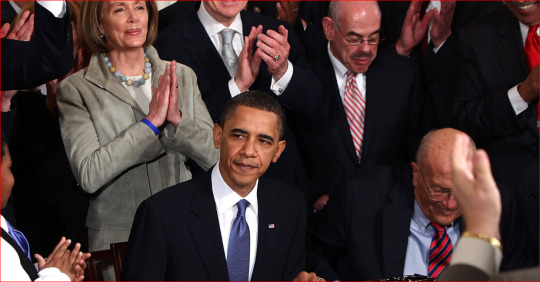
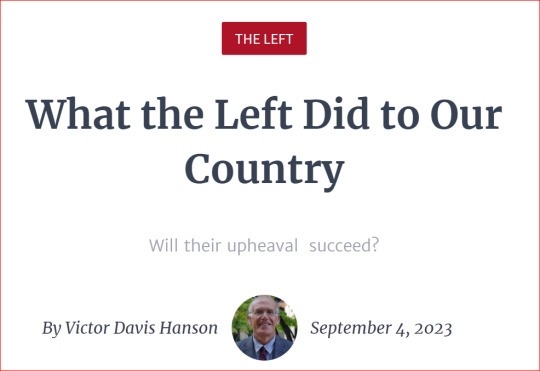
In the last 20 years, the Left has boasted that it has gained control of most of America institutions of power and influence—the corporate boardroom, media, Silicon Valley, Wall Street, the administrative state, academia, foundations, social media, entertainment, professional sports, and Hollywood.
With such support, between 2009-17, Barack Obama was empowered to transform the Democratic Party from its middle-class roots and class concerns into the party of the bicoastal rich and subsidized poor—obsessions with big money, race, a new intolerant green religion, and dividing the country into a binary of oppressors and oppressed.
The Obamas entered the presidency spouting the usual leftwing boilerplate (“spread the wealth,” “just downright mean country,” “get in their face,” “first time I’ve been proud of my country”) as upper-middle-class, former community activists, hurt that their genius and talents had not yet been sufficiently monetized.
After getting elected through temporarily pivoting to racial ecumenicalism and pseudo-calls for unity, they reverted to form and governed by dividing the country. And then the two left the White House as soon-to-be mansion living, mega-rich elites, cashing in on the fears they had inculcated over the prior eight years.
To push through the accompanying unpopular agendas of an open border, mandatory wind and solar energy, racial essentialism, and the weaponization of the state, Obama had begun demonizing his opponents and the country in general: America was an unexceptional place. Cops were racist. “Clingers” of the Midwest were hopelessly ignorant and prejudiced. Only fundamental socialist transformation could salvage a historically oppressive, immoral, and racist nation.
The people finally rebelled at such preposterousness. Obama lost his party some 1,400 local and state offices during his tenure, along with both houses of Congress. His presidency was characterized by his own polarizing mediocrity. His one legacy was Obamacare, the veritable destruction of the entire system of a once workable health insurance, of the hallowed doctor-patient relationship, and of former easy access to competent specialists.
Yet Obama’s unfufilled ambitions set the stage for the Biden administration—staffed heavily with Obama veterans—to complete the revolutionary transformation of the Democratic Party and country.
It was ironic that while Obama was acknowledged as young and charismatic, nonetheless a cognitively challenged, past plagiarist, fabulist, and utterly corrupt Joe Biden was far more effective in ramming through a socialist woke agenda and altering the very way Americans vote and conduct their legal system.
Stranger still, Biden accomplished this subversion of traditional America while debilitated and often mentally inert—along with being mired in a bribery and influence-peddling scandal that may ultimately confirm that he easily was the most corrupt president to hold office in U.S. history.
How was all this possible?
Covid had allowed the unwell Biden to run a surrogate campaign from his basement as he outsourced his politicking to a corrupt media.
Senility proved a godsend for Biden. His cognitive disabilities masked his newfound radicalism and long-accustomed incompetence. Unlike his past failed campaigns, the lockdowns allowed Biden to be rarely seen or heard—and thus as much liked in the abstract as he had previously been disliked in the concrete.
His handlers, the Obamas, and the Bernie Sanders and Elizabeth Warren radical Democrats, saw Biden’s half-century pretense as a gladhander—good ole Joe Biden from Scranton—as the perfect delivery system to funnel their own otherwise-unpopular leftwing agendas. In sum, via the listless Biden, they sought to change the very way America used to work.
And what a revolution Biden’s puppeteers have unleashed in less than three years.
They launched a base attack on the American legal system. Supreme Court judges are libeled, their houses swarmed, and their lives threatened with impunity. The Left promised to pack the court or to ignore any decision it resents. The media runs hit pieces on any conservative justice deemed too influential. The prior Senate Minority Leader Chuck Schumer whipped up a mob outside the court’s doors, and threatened two justices by name. As Schumer presciently put it, they would soon “reap the whirlwind” of what they supposedly had sowed and thus would have no idea what was about to “hit” them.
Under the pretense of Covid fears, balloting went from 70 percent participation on election day in most states to a mere 30 percent. Yet the rates of properly rejected illegal or improper ballots often dived by a magnitude of ten.
Assaults now followed on hallowed processes, laws, customs, and institutions—the Senate filibuster, the 50-state union, the Electoral College, the nine-justice Supreme Court, Election Day, and voter IDs.
Under Biden, the revolution had institutionalized first-term impeachment, the trial of an ex-president while a private citizen, and the indictment of a chief political rival and ex-president on trumped up charges by local and federal prosecutors—all to destroy a political rival and alter the 2024 election cycle.
Biden destroyed the southern border—literally. Eight million entered illegally—no background checks, no green cards, no proof of vaccinations. America will be dealing with the consequences for decades. Mexico was delighted, receiving some $60 million in annual remittances, while the cartels were empowered to ship enough fentanyl to kill 100,000 Americans a year.
“Modern monetary theory,” the Leftist absurdity that printing money ensures prosperity, followed. It has nearly bankrupted the country, unleashed wild inflation, and resulted in the highest interest rates in a quarter-century. Middle-class wages fell further behind as a doddering Biden praised his disastrous “Bidenomics.”
Biden warred on fossil fuels, cancelling federal leases and pipelines, jawboning lending agencies to defund fracking, demonizing state-of-the-art, clean-burning cars, and putting vast areas of oil- and gas-rich federals lands off-limits to drilling.
When gas prices predictably doubled under Biden and the 2022 midterms approached, he tried temporarily to lease out a few new fields, to drain the Strategic Petroleum Reserve, and to beg the Saudis, and our enemies, the Iranians, the Venezuelans, and the Russians, to pump more oil and gas that Biden himself would not. All this was a pathetic ruse to temporarily lower gas prices before the mid-term elections.
Biden abandoned Afghanistan, leaving the largest trove of military equipment behind in U.S. military history, along with thousands of loyal Afghans and pro-American contractors.
Biden insulted the parents of the 13 Marines blown up in this worst U.S. military debacle since Pearl Harbor. He lied to the parents of the dead that he too lost a son in the Iraq war, and when among them later impatiently checked his watch as he seemed bored with the commemoration of the fallen—and made no effort to hide his sense that the ceremony was tedious to him.
Vladimir Putin summed up the Afghan debacle—and Biden’s nonchalant remark that he wouldn’t react strongly to a “minor” invasion of Ukraine if it were minor—as a green light to invade Ukraine.
When Biden did awaken, his first reaction was an offer to fly the Ukrainian president Volodymyr Zelenskyy out of the country as soon as possible. What has followed proved the greatest European killing ground since the 1944-45 Battle of the Bulge, albeit one that has now fossilized into a Verdun-like quagmire that is draining American military supply stocks and killing a half-million Ukrainians and Russians.
Suddenly, there are three genders, not two. Women’s sports have been wrecked by biological men competing as women, destroying a half-century of female athletic achievement. Young girls in locker rooms, co-eds in sororities, and women in prison must dress and shower with biological men transitioning to women by assertion.
There is no longer a commitment to free speech. The American Civil Liberties Union is a woke, intolerant group trying to ban free expression under the pretense of fighting “hate” speech and “disinformation.”
The Left has revived McCarthyite loyal oaths straight out of the 1950s, forcing professors, job applicants, and students applying for college to pledge their commitment to “diversity” as a requisite for hiring, admittance, or promotion. Diversity is our era’s version of the Jacobins’ “Cult of Reason.”
Race relations hit a 50-year nadir. Joe Biden has a long history of racist insults and putdowns. And now as apparent penance, he has reinvented himself as a reverse racial provocateur, spouting nonsense about white supremacy, exploiting shootings or hyping racial tensions to ensure that an increasingly disgusted black electorate does not leave the new Democratic Party.
The military has adopted wokeism, oblivious that it has eroded meritocracy in the ranks and slashed military recruitment. It is underfunded, wracked by internal suspicion, loss of morale and ginned up racial and gender animosity. Its supply stocks are drained. Arms productions is snail-like, and generalship is seen as a revolving door to corporate defense contractor board riches.
Big-city Democratic district attorneys subverted the criminal justice system, destroyed law enforcement deterrence, and unleashed a record crime wave. Did they wish to create anarchy as protest against the normal, or were they Jokerist nihilists who delighted in sowing ruin for ruin’s sake?
Radical racial activists, with Democrat endorsement, demand polarizing racial reparations. The louder the demands, the quieter they remain about smash-and-grab looting, carjacking, and the swarming of malls by disproportionally black teens—even as black-on-black urban murders reach record proportions.
In response, Biden tried to exploit the growing tensions by spouting lies that “white supremacy” and “white privilege” fuel such racial unrest—even as his ill-gotten gains, past record of racist demagoguery and resulting lucre and mansions appear the epitome of his own so-called white privilege.
This litany of disasters could be vastly expanded, but more interesting is the why of it all?
What we are witnessing seems to be utter nihilism. The border is not porous but nonexistent. Mass looting and carjackings are not poorly punished, but simply exempt from all and any consequences. Our downtowns are reduced to a Hobbesian “war of all against all,” where the strong dictate to the weak and the latter adjust as they must. The streets of our major cities in just a few years have become precivilizational—there are more human feces on the sidewalks of San Francisco than were in the gutters of Medieval London.
The FBI and DOJ are not simply wayward and weaponized, but corrupt and renegade. Apparently the perquisite now for an FBI director is the ability either to lie while under oath or better to mask such lying by claiming amnesia or ignorance.
Immigration is akin to the vast unchecked influxes of the late Roman Empire across the Danube and Rhine that helped to finish off a millennium-old civilization that had lost all confidence in its culture and thus had no need for borders.
In other words, the revolution is not so much political as anarchist. Nothing escapes it—not ceiling fans, not natural gas cooktops, not parents at school board meetings, not Christian bakeries, not champion female swimmers, not dutiful policemen, not hard-working oil drillers, not privates and corporals in the armed forces, not teens applying on their merits to college, not anyone, anywhere, anytime.
The operating principle is either to allow or to engineer things to become so atrocious in everyday American life—the inability to afford food and fuel, the inability to walk safely in daylight in our major cities, the inability to afford to drive as one pleases, the inability to obtain or pay back a high interest loan—that the government can absorb the private sector and begin regimenting the masses along elite dictates. The more the people tire of the leftist agenda, the more its architects furiously seek to implement it, hoping that their institutional and cultural control can do what ballots cannot.
We could variously characterize their efforts as destroying the nation to save it, or burning it down to start over, or fundamentally transforming America into something never envisioned by the Founders.
Will their upheaval succeed? All the levers of the power and money are on the side of the revolutionaries. The people are not. And they are starting to wake to the notion if they do not stop the madness in their midst they very soon won’t have a country.

A perfect metaphor for what the progressives have done to America.
356 notes
·
View notes
Text
Aziraphale has memorized Winnie the Pooh and it’s more important than you think
Basically Neil Gaiman was casually dropping hints about Good Omens 2 plot as early as 2019:
Aziraphale has memorized the Winnie the Pooh books, several Georgette Heyer novels, and Bobo’s Modern Coin Magic, though.
Georgette Heyer was an English novelist and short-story writer, in both the Regency romance (which she has virtually invented, based on extensive historical research as well as Jane Austen’s influences) and detective fiction genres. She used romantic plots and happy endings in both.
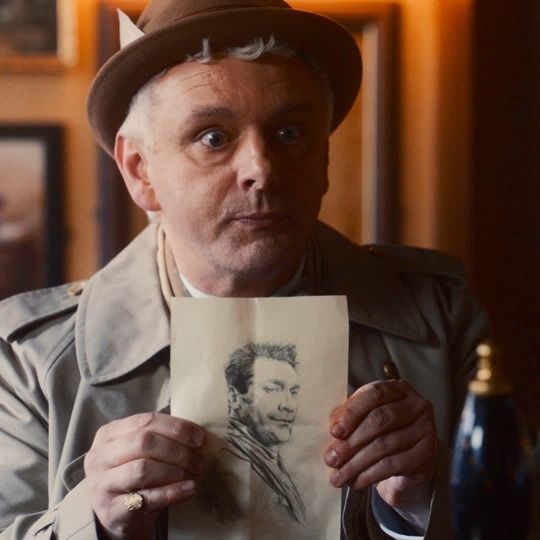
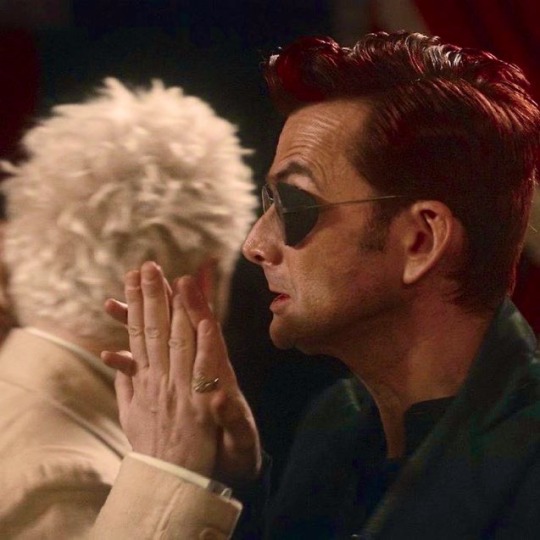
That is, with the exception of Penhallow, her 1942 mystery novel explaining how a desperate act intended to bring about good consequences brings only more tragedy in its wake instead (and spoiler alert: murdering a thoroughly unlikeable elderly character doesn’t secure the expected peace or happiness).

J. B. Bobo’s Modern Coin Magic, while not that modern anymore with a publishing date of 1952, provides a complete treatise on sleight of hand coin conjuring, making an excellent companion for those who want to impress and entertain with some classic magic tricks. Including working professional magicians like Fell the Marvelous.
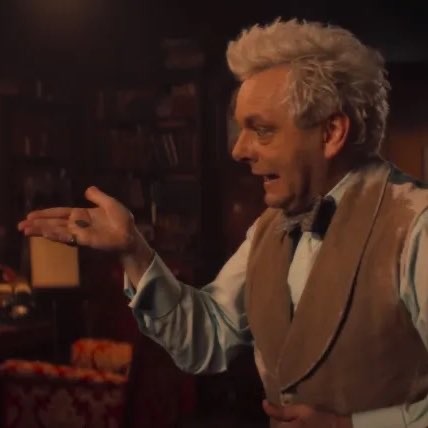
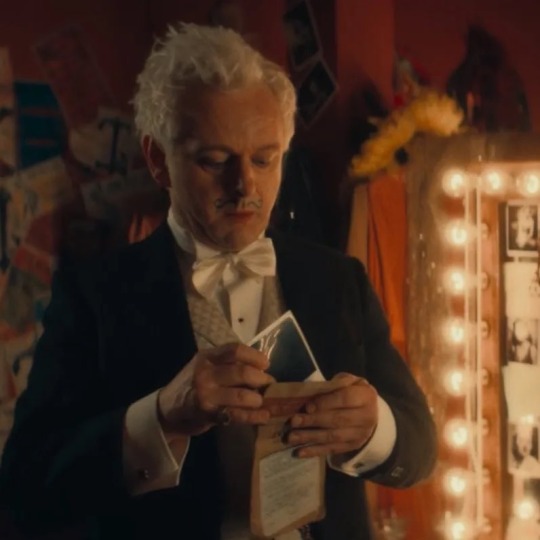
But what about the Winnie the Pooh books? Sure, they offer the ultimate childhood escapist fantasy with a happy-go-lucky story and cheerful characters living in the Garden of— um, Hundred Acre Wood. The original Ashdown Forest is, by the way, located under the South Downs National Park authority.
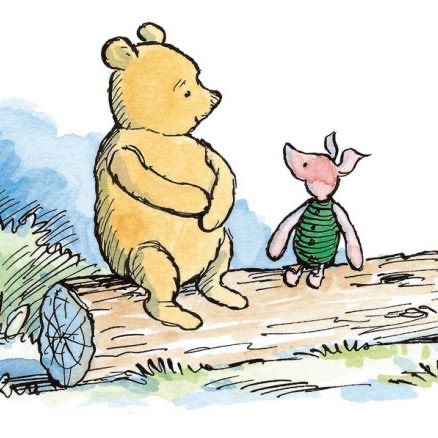
A. A. Milne has participated in and survived two world wars. Writing was a creative way of talking about his struggles and those of many other individuals affected by trauma, mental health issues and illnesses that are left untreated and undiagnosed. Each of the animals famously symbolizes different disorder.

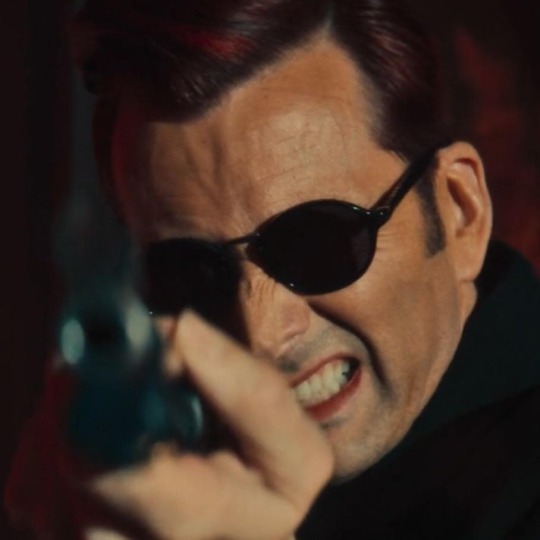
And according to the major theme of the power of friendship saving the day (with an occasional help of Christopher Robin, who plays his ineffable game as long as his adults let him), even a scary guest turns out not so scary after all, becoming a new friend himself.
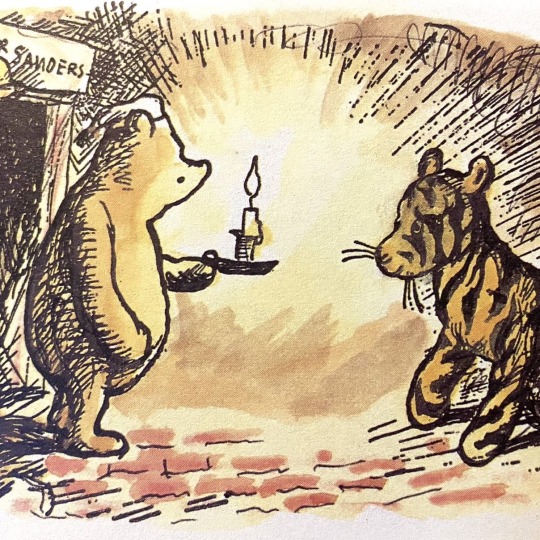

#Yuri is doing her thing#good omens#good omens meta#go2 spoilers#go2 meta#go2#good omens 2#aziraphale#fell the marvelous#south downs cottage
204 notes
·
View notes
Text
How to write an elderly main character?
I'm back! Because school is quite busy and I'm about to take exams, I don't have time to post new articles. I wonder if anyone remembers me. (probably not, lol)
There are many novels that feature elderly as main characters, for example, "The Hundred-Year-Old Man Who Climbed Out the Window and Disappeared" by Jonas Jonasson or "Our Souls at Night" by Kent Haruf. Today, I'll show you a few tips for writing this type of character.
When writing an elderly main character, it's important to approach the portrayal with sensitivity, authenticity, and a nuanced understanding of the aging process. Here are some tips to consider when developing an elderly main character:
Characterization: Create a well-rounded character with depth and complexity. Consider their personality traits, background, life experiences, and values. Remember that elderly individuals, like people of any age, can have diverse personalities and interests. Give your character hobbies, interests, and passions that reflect their individuality and bring richness to their life. Older adults can have a wide range of hobbies, such as gardening, art, music, or storytelling, which can add depth to their character.
Realism: Research and understand the aging process. Gain insights into the physical, cognitive, and emotional changes that commonly occur in older adults. This will help you create a realistic portrayal of your elderly character and avoid stereotypes or misconceptions.
Language and Dialogue: Reflect the character's age and life experience in their language and dialogue. Consider the vocabulary, speech patterns, and cultural references that may align with their generation. However, be cautious not to overuse stereotypes or make assumptions about their language abilities.
Challenges and Strengths: Portray the challenges and strengths that come with aging. Depict the character's struggles with age-related issues such as health concerns, memory loss, or changes in mobility. These changes can impact how your character interacts with the world and inform their daily routines and challenges. Also, highlight their resilience, wisdom, and life experience as sources of strength.
Relationships and Interactions: Explore the character's relationships with people of different ages, including family members, friends, and younger individuals. Show how their interactions and perspectives may differ from those of younger characters, while also highlighting the potential for intergenerational connections. This can involve exploring intergenerational conflicts, mentorship, or the passing down of wisdom and traditions.
Avoid Ageism: Be mindful of ageist stereotypes or biases and avoid perpetuating them in your portrayal. Treat the character with respect and dignity, highlighting their agency, autonomy, and ongoing personal growth.
Emotional Depth: Explore the character's emotional landscape, including their joys, fears, regrets, and aspirations. Show their emotional growth and the ways in which they navigate and adapt to life's challenges.
Seek Input: Consider seeking input or feedback from older adults or conducting research to gain firsthand insights into their experiences. This can help ensure an authentic portrayal and avoid generalizations or assumptions.
Life History: Develop a backstory for your character that encompasses their life experiences, significant events, and milestones. Consider how their past has shaped them and influenced their perspectives, values, and motivations.
Cultural Context: Take into account the cultural and historical context in which your character grew up and lived their life. Different generations may have distinct cultural references, societal expectations, or historical events that have influenced their worldview.
Social Roles: Explore the roles your character has played throughout their life, such as parent, grandparent, spouse, or professional. Consider how these roles may have evolved over time and how they perceive their identity in relation to these roles.
Please remember that every character is unique, and individual differences should be considered when writing an elderly main character. Approach the portrayal with empathy, respect, and a commitment to representing the complexity and richness of older individuals' lives.
If you want to read more posts about writing, please click here and give me a follow!
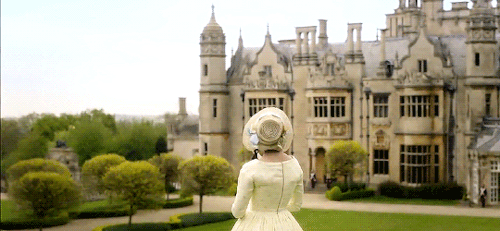
#writing#creative writing#writerscommunity#writer things#writersociety#on writing#writers#writeblr#writers on tumblr#writblr#writings#words#writer#write#writers and poets#writersofinstagram#writerscorner#writerslife#writing stuff#writing tools#writing prompt#writing community#writing tips#writing inspiration#writing advice#elderly#character profile#original character#character design#my characters
247 notes
·
View notes
Text
The Reluctant Ruler Trope: A Philosophical Inquiry into Unwanted Power, Responsibility, and the Burden of Leadership

WC: 3,489
Index
Introduction
The Reluctant Ruler in Literature and Folklore
The Existential Dilemma of Unwanted Authority
Political Implications and the Burden of Responsibility
A Special Case or a Universal Relatability?
Closing Words
Introduction
“The world is something that was put into your hands and that you must deal with - so you will. You have a rigid back and steady hands, either metaphorically or physically. Is it nature or nurture? You don't know. You are tired of being steady. You dream of feeling alive. Not that you aren’t, but, sometimes, it’s hard to remember that there is a heart between your ribs.” —“Are You A Soldier, Poet, or A King?” quiz by @atlanticsea
Does anyone here remember the “Soldier, Poet, King” quiz that went around about a year or so ago? When I initially took it, I expected “Poet;” you can imagine my surprise when the “King” result absolutely obliterated my mental health.
As I’ve found, a common theme in my writing is the Reluctant Ruler trope, where either 1) a character is thrust into the role of a savior, hero, or king/queen despite not having any wish to lead people or 2) a character assumes the role of a leader without the full understanding of the morally corrupting demands of the job.
The narrative trope of the Reluctant Ruler has long captivated the human imagination, resonating across cultures and epochs. From mythical tales of kings and queens reluctant to ascend the throne to contemporary narratives of reluctant heroes and leaders, this archetype speaks to fundamental questions about the nature of power, responsibility, and the human condition. But what makes this trope such a tragic and believable character? How do we, as an audience, end up relating to and debating the conflicts and moral dilemmas that these characters face? Today, we embark on a philosophical inquiry into the Reluctant Ruler trope, aiming to uncover its deeper meanings and implications within existential and political philosophical discourse.
The Reluctant Ruler in Literature and Folklore
The archetype of the reluctant ruler is deeply embedded in the narratives of literature and folklore, transcending cultural and historical boundaries. Across diverse traditions, tales abound of individuals thrust into positions of leadership against their will, grappling with the weight of power and the burdens of governance.
Shakespeare’s “Hamlet:” One of the most iconic depictions of the Reluctant Ruler can be found in William Shakespeare's timeless tragedy, “Hamlet.” Prince Hamlet, the melancholic protagonist, is suddenly confronted with the task of avenging his father’s murder and assuming the throne of Denmark. Despite being heir to the throne, Hamlet is plagued by doubt, indecision, and existential angst. His famous soliloquy, “To be, or not to be,” encapsulates the profound existential crisis he faces, torn between the demands of duty and the desire for personal authenticity. Hamlet’s reluctance to embrace his role as king stems not only from fear or cowardice but from a profound skepticism about the legitimacy of authority and the corrupting influence of power.
The Arthurian Legend: In the rich tapestry of Arthurian legend, the motif of the Reluctant Ruler is exemplified in the character of King Arthur himself. According to some versions of the myth, Arthur is initially unaware of his royal lineage and is raised as a commoner by Sir Ector. Upon discovering his true identity and rightful claim to the throne, Arthur reluctantly accepts the mantle of kingship, guided by the wise counsel of Merlin and the moral imperative to uphold justice and chivalry. Despite his noble intentions, Arthur grapples with the burdens of leadership, facing betrayals, challenges to his authority, and the tragic consequences of his own choices. His reluctance to embrace his destiny as king reflects the ambivalence inherent in assuming power and the moral ambiguities of governance.
The Biblical Story of Moses: In the Abrahamic traditions, the narrative of Moses provides another compelling example of the Reluctant Ruler trope. According to the Book of Exodus, Moses is initially an ordinary Israelite that ran from his station as a prince of Egypt, content to live as a shepherd in the wilderness. However, when called upon by God to lead his people out of bondage in Egypt, Moses initially resists, citing his own inadequacies and speech impediment. Despite his reluctance, Moses eventually accepts the divine mandate and becomes the revered leader of the Israelites, guiding them through the trials of the Exodus and delivering the Ten Commandments at Mount Sinai. Moses’s reluctance to assume leadership underscores the theme of human frailty and the transformative power of faith and divine providence.
The Existential Dilemma of Unwanted Authority
Despite not having instances in our lives where we are unexpectedly crowned king or being spoken to by a deity, there are still profound lessons in identity and responsibility that we can pull from these characters.
The Anguish of Freedom and Responsibility
Existentialist philosophers such as Jean-Paul Sartre asserted that “existence precedes essence,” emphasizing the radical freedom and responsibility of human beings to define their own meaning and purpose in a seemingly indifferent universe. For the Reluctant Ruler, this existential freedom becomes a source of anguish and uncertainty. Suddenly endowed with authority and influence, they are confronted with the weight of responsibility and the moral implications of their actions. The existential angst of the reluctant ruler arises from the tension between the desire for autonomy and the demands of duty, as they struggle with the paradox of being simultaneously free and bound by social expectations.
Furthermore, with freedom comes the moral imperative to act responsibly and ethically. The Reluctant Ruler, however, finds themselves burdened with the weight of moral decision-making, as they navigate complex ethical dilemmas and confront the consequences of their actions. Existentialist philosophy emphasizes the inherent responsibility of individuals to create their own moral framework and to confront the ethical implications of their choices with honesty and integrity. The anguish of responsibility lies in the tension between the desire for moral clarity and the recognition of the inherent ambiguity and uncertainty of ethical decision-making. The reluctant ruler must contemplate on the ethical complexities of their role, striving to uphold their moral principles amidst the exigencies of power and governance.
Authenticity and Self-Deception
Central to the existential dilemma of unwanted authority is the quest for authenticity (we already knew this; I wrote two posts on authenticity already that you can check out here and here)—the authentic expression of one’s true self and values in the face of external pressures and expectations. The Reluctant Ruler may experience profound existential alienation as they navigate the demands of their role, questioning whether they are living in accordance with their own genuine desires and beliefs or merely conforming to societal norms and conventions.
In fact, they may be tempted to resort to self-deception—to deceive themselves and others about the true nature of their actions or motivations. Existentialist philosophy warns against the dangers of inauthenticity and self-delusion, highlighting the existential crisis that arises from living inauthentically and betraying one’s own values. The Reluctant Ruler may succumb to the pressures of their position, rationalizing their actions or compromising their principles in order to maintain power or avoid conflict. Self-deception becomes a means of coping with the existential anguish and moral dilemmas inherent in their role, providing a false sense of security and comfort amidst the uncertainties of leadership.
Self-deception ultimately leads to existential alienation—the estrangement from one’s authentic self and the sense of disconnection from the world. The Reluctant Ruler who succumbs to self-deception finds themselves adrift in a sea of moral ambiguity and existential angst, unable to reconcile their actions with their inner convictions.
The Absurdity of Human Existence
“The Absurdity of Human Existence” is a philosophical concept rooted in existentialist thought, particularly articulated by philosophers such as Albert Camus and Jean-Paul Sartre. It posits that human life is inherently absurd, devoid of inherent meaning or purpose, and characterized by the fundamental tension between the human desire for meaning and the indifferent, chaotic nature of the universe.
In assuming positions of power unwillingly, the Reluctant Ruler confronts the absurdity of their situation, grappling with the arbitrary nature of authority and the futility of their efforts to impose order and control upon a chaotic world. The absurdity of leadership lies in the recognition of its inherent limitations and the inevitability of failure and impermanence. Despite their best intentions, the Reluctant Ruler may find themselves overwhelmed by their predicament, struggling to find meaning and significance in a world devoid of ultimate purpose.
Here is where another familiar element of existence comes into play: the illusion of control. The illusion of control is a psychological concept that refers to the tendency of individuals to overestimate their ability to influence or control events, particularly in situations characterized by uncertainty or randomness.
For the Reluctant Ruler, the illusion of control becomes apparent as they assume positions of power unwillingly and attempt to impose order and control upon a world that defies their efforts. Despite their best intentions, they soon come to realize the inherent unpredictability and uncontrollability of the events and circumstances they face. This recognition challenges their preconceived notions of authority and power, revealing the illusory nature of their perceived control.
The Reluctant Ruler may initially believe that they have the ability to shape the course of events and influence outcomes according to their will. However, as they encounter resistance, opposition, and unforeseen challenges, they begin to understand the limitations of their authority and the unpredictable nature of the world they seek to govern. This realization undermines their confidence and exposes the fragility of their sense of control.
Moreover, the illusion of control can lead the Reluctant Ruler to engage in behaviors and strategies aimed at maintaining the illusion of power, even in the face of overwhelming evidence to the contrary. They may resort to authoritarian measures, manipulation, or denial of reality in an attempt to assert their authority and preserve their sense of control. However, these efforts ultimately prove futile, further reinforcing the absurdity of their situation.
The existential implications of the illusion of control lie in its confrontation with the fundamental unpredictability and contingency of human existence. The Reluctant Ruler's quest for control becomes a Sisyphean task, as they strive to impose order upon a world characterized by chaos and uncertainty. In confronting the illusion of control, they are forced to confront the absurdity of their condition and wrestle with the inherent limitations of human agency in the face of existential uncertainty.
Political Implications and the Burden of Leadership
Naturally, we cannot talk about the complexity behind the Reluctant Ruler without diving into those whom they govern. In examining the reluctant ruler trope through the lens of political philosophy, we confront the complex interplay between governance, legitimacy, and the ethical responsibilities of leadership.
Legitimacy and Consent
The concepts of legitimacy and consent are central to theories of political authority, shaping the foundation of governance and the relationship between rulers and the ruled. In the context of the Reluctant Ruler trope, the legitimacy of political authority is called into question, as leaders may assume power unwillingly, without the explicit consent or endorsement of those they govern.
Political theorists have long debated the sources of legitimacy in governance, seeking to identify the basis upon which political authority is justified. Traditionally, legitimacy has been derived from various sources such as divine right, tradition, charisma, or popular consent. However, the assumption of power by a Reluctant Ruler complicates these traditional sources, as their authority may not be grounded in the typical mechanisms of legitimacy. Instead, the legitimacy of the reluctant ruler may be contingent upon factors such as adherence to legal norms, effectiveness in governance, or recognition by key power holders.
In democratic societies, where the principle of popular sovereignty reigns supreme, the consent of the governed is considered foundational to the legitimacy of political authority. Democratic legitimacy is typically understood to derive from the consent of the people, expressed through free and fair elections. However, the Reluctant Ruler challenges this notion, as their assumption of power may not be the result of popular choice or electoral mandate. Or, on the other hand, perhaps it was, indeed, the populace that raised them to their position while they continued to protest and fight against it. This raises questions about the compatibility of their leadership with democratic ideals and the accountability of political institutions to the will of the people.
A Special Case or Universal Relatability?
The Reluctant Ruler archetype, emblematic of individuals thrust into positions of power against their will, serves as a focal point for exploring the intricate interplay between existential realization, political pragmatism, and ethical considerations within the realm of political philosophy and ethical theory. Through the lenses of political philosophers and ethical theorists, such as Niccolò Machiavelli, Hannah Arendt, Immanuel Kant, and Aristotle, we can seek to elucidate the moral spectrum of the Reluctant Ruler, shedding light on the ethical and existential dimensions of their predicament and the broader implications for human nature and governance.
Political Philosophers:
Thinkers such as Niccolò Machiavelli and Hannah Arendt might consider the ethical and political dimensions of the Reluctant Ruler trope. They would examine questions of legitimacy, authority, and the responsibilities of leadership, shedding light on how the Reluctant Ruler’s predicament illuminates broader themes in political philosophy.
Niccolò Machiavelli
Niccolò Machiavelli, a seminal figure in political philosophy, is often associated with political realism, a perspective that emphasizes practical considerations over moral ideals in governance.
Machiavelli’s political realism emphasizes the importance of power dynamics, interests, and strategic calculations in politics. He might argue that the Reluctant Ruler cannot afford to be guided solely by moral principles or existential concerns but must instead prioritize the preservation of authority and the maintenance of order.
For him, the reluctant ruler’s primary concern should be establishing and consolidating their authority, regardless of the circumstances of their ascension to power.
He famously suggests in The Prince that rulers should be prepared to act ruthlessly when necessary, even if it means sacrificing ethical principles.
The ends justify the means in politics, and that the reluctant ruler must be willing to employ any means necessary to achieve their goals.
Ultimately, Machiavelli would likely emphasize the importance of maintaining order and stability as the primary goals of the reluctant ruler. He might argue that the ruler's legitimacy and authority depend on their ability to govern effectively and preserve the social order, even if it requires making difficult decisions or compromises.
Machiavelli might caution against allowing existential angst or moral qualms to undermine the reluctant ruler's ability to govern decisively. He would likely stress the need for pragmatism and flexibility in navigating the complexities of political life.
Hannah Arendt
Hannah Arendt was a prominent political theorist known for her contributions to the understanding of totalitarianism, the nature of power, and the concept of political action.
Arendt would delve into the existential angst experienced by the reluctant ruler, examining how their struggle with assuming power unwillingly reflects broader themes of human existence. She might explore the absurdity of the situation, where individuals find themselves thrust into positions of authority without their consent or desire.
Arendt would likely emphasize the importance of individual conscience in guiding the actions of the reluctant ruler. She might suggest that the ruler's moral integrity is central to their ability to exercise legitimate and effective leadership, even in the face of existential uncertainty.
She might also argue that political action is inherently bound up with questions of ethics and morality, and that the reluctant ruler's existential crisis serves as a catalyst for deeper reflection on the ethical dimensions of governance.
Arendt might caution against sacrificing moral integrity for the sake of pragmatic considerations, suggesting that the Ruler’s adherence to their conscience is ultimately what determines the legitimacy of their leadership.
Ethical Thinkers
Thinkers like Immanuel Kant and Aristotle would likely explore the ethical dilemmas faced by the Reluctant Ruler. They would analyze how the tension between personal ethics and pragmatic considerations shapes the Ruler’s decision-making process, offering insights into human moral psychology and the pursuit of virtuous leadership.
Immanuel Kant
Kant’s deontological ethics emphasizes the importance of moral duty and universal principles in guiding ethical behavior. He would likely analyze the Reluctant Ruler’s predicament by focusing on the categorical imperative, which states that individuals must act according to principles that can be universally applied.
Kant might argue that the Reluctant Ruler faces a moral obligation to uphold certain ethical principles, even if it conflicts with pragmatic considerations. He would emphasize the importance of acting out of a sense of duty and moral integrity, rather than being swayed by expediency or self-interest.
Aristotle
Aristotle’s virtue ethics focuses on the development of moral character and the cultivation of virtuous qualities. He would likely analyze the Reluctant Ruler’s ethical dilemmas by considering how their decisions reflect their moral virtues and character traits.
Aristotle might argue that the reluctant ruler should strive to embody virtues such as courage, wisdom, and justice in their governance. He would emphasize the importance of practical wisdom (phronesis) in navigating the complexities of political life, suggesting that the ruler should aim to achieve eudaimonia, or flourishing, through virtuous leadership.
On Our Nature
Needless to say, not only can we reflect on our own ethical “what-ifs” in parallel to the Reluctant Ruler trope; through this character study, we can unearth a multitude of political and existential debates and still never settle on a universal answer.
The perpetual debates and unanswered questions surrounding the Reluctant Ruler trope speak volumes about human nature and the complexity of individual experiences. At its core, the Reluctant Ruler archetype encapsulates the fundamental tensions between existential realization, ethical responsibility, and political pragmatism, reflecting the intricate interplay of human desires, values, and motivations.
Firstly, the inability to settle on a universal answer regarding the Reluctant Ruler trope underscores the inherent complexity and ambiguity of human existence. Human nature is characterized by its multifaceted makeup, encompassing a diverse range of perspectives, beliefs, and experiences. The reluctance of individuals to embrace leadership roles speaks to our innate desire for autonomy, authenticity, and personal fulfillment, as well as our inherent susceptibility to doubt, uncertainty, and existential angst. The analyses surrounding the Reluctant Ruler trope reflect the diversity of human experiences and the myriad ways in which individuals examine with questions of identity, purpose, and morality.
Moreover, the fact that many individuals can relate to the Reluctant Ruler trope on a personal level speaks to the universality of human struggles and aspirations. Whether it be the fear of assuming responsibility, the desire for authenticity and self-expression, or the ethical dilemmas inherent in leadership, the themes embodied by the Reluctant Ruler resonate with people from all walks of life.
However, the Reluctant Ruler trope also serves as a mirror through which we can reflect on our own ethical convictions, political beliefs, and existential uncertainties. By examining the complexities of this archetype, we are compelled to confront our own values, biases, and assumptions, and to consider how they shape our perceptions of leadership, responsibility, and human nature. The inability to settle on a universal answer regarding the Reluctant Ruler trope challenges us to confront the inherent ambiguity and uncertainty of human existence, prompting us to engage with questions of identity, meaning, and morality in our own lives.
Closing Words
What initially appears as a narrative device in storytelling reveals itself as a mirror reflecting the intricacies of our own ethical frameworks, existential dilemmas, and political realities.
At its essence, the Reluctant Ruler archetype embodies the universal struggle between autonomy and responsibility, authenticity and conformity, freedom and obligation. Yet, beyond the realm of fiction, it prompts us to reflect on our own ethical convictions and existential uncertainties. Are we, too, begrudging in our own lives, navigating the delicate balance between personal desires and societal expectations? Do we confront the existential angst of freedom and responsibility, or do we succumb to the illusion of control and self-deception?
Moreover, the Reluctant Ruler challenges us to examine the legitimacy of political authority and the ethical responsibilities of leadership. In a world where governance is often characterized by power struggles and moral ambiguities, how do we reconcile the demands of pragmatism with the imperatives of justice and integrity? How do we ensure that those in positions of power govern with wisdom, virtue, and compassion?
Ultimately, the Reluctant Ruler trope serves as a catalyst for introspection and dialogue, inviting us to confront the complexity of human nature and the ethical dimensions of governance. As we scrutinize the unresolved questions and perpetual debates surrounding this archetype, we are reminded of the enduring relevance of philosophy in our quest for understanding, meaning, and ethical clarity.
In the end, the Reluctant Ruler challenges us not only to ponder the existential dilemmas of fictional characters but also to confront the ethical complexities of our own lives and societies. It is through this introspective journey that we may gain deeper insights into the nature of leadership, autonomy, and the human condition, and perhaps, find a path towards a more just, compassionate, and authentic world.
#writers on tumblr#writeblr#writers#on writing#creative writing#writer#writing#writers and poets#writerscommunity#novel writing#writing life#writing community#writing inspiration#writing tips#writer stuff#writers of tumblr#writer community#writer problems#writer things#writer on tumblr#writing trope#tropes#character tropes#trope talk#trope analysis#trope prompts#tropes i love#characterization#writing tropes
141 notes
·
View notes
Note
so i’ve always been annoyed by the belief that “sam and dean are toxically co-dependent, especially dean!” like it just baffles me once i remember all the times they’ve been apart without one of them being dead (and actually including post swan song to an extent), but i’ve never been able to properly articulate why i think dean at least isn’t really co-dependent on sam. like there’s a difference between being (co)dependent on somebody and dean’s parentification right? thanks!
I'll preface this by saying I am not a medical professional nor have I studied academic literature on codependency in great detail. That said, "codependency" is usually just a buzzword used colloquially to describe people who are obsessed with each other anyway. I address the colloquial use and how Sam is much more unhinged here. I'm guessing the colloquial use is really more what you mean, but if you're looking for something different or a little more specific than that, I can probably write or point you to some other things I've written if you give me something more specific to go on.
That said, there is something about the way fandom talks about "codependency" between Sam and Dean that bothers me, and I think by reading around about codependency today after I got this ask, and finding out that this term is controversial among mental health professionals as well... I finally figured out why.
I think to a lot of people, "codependent" has become synonymous with words like "needy" and "suffocating". However, the WebMD type articles I started with, suggest that the partner of the codependent party is the one whose needs seem to constantly overshadow and outweigh the needs of the codependent partner in the relationship. While the codependent partner can exhibit negative behaviors, the primary problem of the codependent party is that in being a caretaker, they can lose all sense of their identity and boundaries, and don't know who they are outside of being a caretaker for others. However, this is a more modern take on the term. Because these articles I started with mentioned academic controversy, I then found a few academic papers to skim, and this proved to be even more helpful in understanding why I... don't like this term very much.
First, the historical origins of it are... off-putting. The term "codependency" first emerged in academic literature in the 1940s to describe wives with alcoholic husbands who behave as "enablers" [1, 2]. I probably don't have to point out how different things were for women back then, and how rampantly sexist that context makes this first wave of literature sound, but it's discussed extensively in this article. Second, there is more stigma associated with the term partly because Alcoholics Anonymous (shocking /s) latched onto it starting in the 60s and 70s:
The influence of the AA culture in shaping the concept of codependency as an illness offered the idea that people who were close to the substance user were themselves suffering from an illness (O’Briean and Gaborit 1992). These people were viewed as enablers and coalcoholics (Cotton 1979). [ 1 ]
I... think I am probably not the only one who finds that utterly rancid to read (some academics writing on the subject certainly seem to):
According to Gus Napier, a noted family therapist, it is "ridiculous" to label codependency as a disease, because it is a culturally conditioned response of an overfunctioning person in relationship with an underfunctioning person (Meacham, 1990-1991). [2]
Some researchers who have pushed the term "codependency" as a diagnosis have actually suggested that literally anyone who is living with someone with an addiction should be called co-dependent by definition, regardless of any behavior they may exhibit, which tells you a lot about the lack of consensus and how meaningless the term can be [2]. The term (especially within the disease model where codependency itself is a from of addiction) has been criticized by many researchers for the misogyny through which the term originated, for unproductive negative labeling and pathologizing of people (especially women) dealing with incredibly difficult situations with their loved ones, for victim-blaming people (especially women stuck in abusive relationships) for the actions of their partners, for tangentially—negative stereotyping about people with serious addictions, and for conflating addiction with interpersonal problems, and in the extreme case—for suggesting separation from ones family is the solution to addiction and supporting someone with an addiction somehow always enables them [1, 2].
Since the original stream of literature related to addiction, codependency has rebranded and expanded into literature on family experiences with abuse and mental and physical illness. Which is where we get articles like this one I already linked. The codependent party is still a caretaker in these settings, caring for the needs of a loved one who is ill. Still, "codependency" is not an official medical diagnosis (i.e. not in the DSM-5). It's a term that has been used in academic literature by mental health professionals, when trying to describe a range of behaviors within dysfunctional families. These researchers do not agree on the term's meaning or on whether it even is or should be a diagnosis. Many are interested in it only from an interpersonal or personality perspective, which is also where we should stick.
Taking all of this into account though, I think the very first thing we have to ask ourselves is what exactly we get out of using the term "co-dependency" to describe Sam and/or Dean when the term doesn't even really have an agreed-upon meaning. Is the intention to write interesting character analysis, or is the intention to glorify or criticize using a term that has historically stigmatized understandable human reactions to troubled family situations? I think the goal has perhaps too often been the latter.
That said, I've already been referencing it, but I think this article does a good job of summarizing much of the literature, and then actually focusing on people who do choose, of their own accord, to identify with the term "codependent" because it is helpful for them in understanding their own lived experience and their patterns within relationships. I don't think there's anything wrong with wanting to explore this as it relates to Sam and Dean with the right motivations. If you read the accounts of the respondents who choose to identify with the term, you'll see shades of Sam and Dean I think (I have written something pretty close to the chameleon-self about season 1 Dean, and I can apply that one to Sam too through his attempts to fit in at Stanford). When it comes to my experience with these characters however, I just don't find that I personally see any value in analyzing Sam and Dean through the word "codependent" given it's lack of agreed-upon meaning professionally and colloquially.
It seems to me that the term itself leads to more confusing conversations instead of less confusing ones because of the lack of clear definition, and the potential for negative stereotyping instead of actual edifying analysis is extremely off-putting to me. It just doesn't do anything for me personally. The issues to which it relates I think are interesting (especially parentification which is a term I do find useful), and I think criticisms leveled against the term are also useful to read in understanding ones own struggles with how fandom tends to frame Dean as a caretaker who they believe is actually somehow responsible for everyone else's decisions. But I think that perhaps I prefer words and concepts that are better defined than the muddiness of the term "codependent".
Lastly: Even if I'm not a particular fan of the term, the fact is that the actual show uses the term twice—in season 5 (shoutout to butch--dean's transcript search engine). Once in 5.11 "Sam, Interrupted" (to Dean):
DR. FULLER
Well, to be frank, uh, the relationship that you have with your brother seems dangerously codependent. I think a little time apart will do you both good.
First, this dude doesn't really know what's going on and thinks Sam and Dean are having delusions. However, in season 5, Sam's experience with demon blood is repeatedly paralleled with drug or alcohol addiction, and Sam is someone for whom Dean has been made to feel responsible for most of his life. This episode addresses Dean's overly burdensome responsibilities in other ways and it's also come up in the past in 1.12, 2.09, 2.10, and 4.05. I prefer to discuss this theme with much more specific terms. In this case, I would say Dean has an "overactive sense of responsibility to others", originating first with his childhood experiences with parentification. Sam also has a tendency to try and make Dean shoulder responsibility for his decisions when they backfire, and does so multiple times related to the demon blood (4.04, 4.21, 5.05). Cas and Zachariah also both blame Dean for Sam breaking the last seal because he didn't stop him in time (5.01, 5.02) and Bobby criticizes how Dean responds to Sam's addiction (4.22).
And then again in 5.18 "Point of No Return", specifically when Zachariah (my favorite manipulative angel) tries to get Adam to be on his side by basically calling Sam and Dean creepy incestuous weirdos:
ZACHARIAH
So you know you can’t trust them, right? You know Sam and Dean Winchester are psychotically, irrationally, erotically codependent on each other, right?
This one honestly to me is just Zachariah doing Zachariah things. I'll reach these episodes on my rewatch fairly soon though, so we'll see if I end up talking about it more then.
Bacon, I., McKay, E., Reynolds, F. et al. The Lived Experience of Codependency: an Interpretative Phenomenological Analysis. Int J Ment Health Addiction 18, 754–771 (2020). https://doi.org/10.1007/s11469-018-9983-8
Anderson, S. C. (1994). A Critical Analysis of the Concept of Codependency. Social Work, 39(6), 677–685. http://www.jstor.org/stable/23717128
108 notes
·
View notes
Text
SJ and the Pitfalls of Toxic Masculinity
Liking women wasn’t shameful in the least, but treating a woman as your savior, shrinking into her embrace in search of self-confidence—Shen Qingqiu needed no one to tell him how incredibly shameful that was. So he would rather die than tell anyone, particularly not Yue Qingyuan.
- Yue Qingyuan and Shen Qingqiu Extra
Hot take: og!SQQ had toxic ideas about masculinity, and it ruined him.
SVSSS is all about the ✨Toxic Masculinity✨ but this seems to be more associated with SY than SJ??? So yeah, lets talk about SJ (my poor meow meow).
There’s actually some subtlety here, because talking about SJ and masculinity naturally involves an interplay between historical and modern views on masculinity in China, which is something that has developed over time and has influences from other cultures (e.g. the west and our views on masculinity). (Interesting thing if you haven't already come across it) I am… not qualified to read the subtleties here.
To note, SJ is coded as masculine… sort of. He’s the head of the scholarly peak, a master of the Four Arts, which is one facet of ideal masculinity in traditional Chinese values. (Fluttering a fan around was very gentleman-like. Although also, expressing your emotions through poetry and copious amounts of tears was very masculine back in the day. 'Traditional masculinity' has and always will be an elusive ideal.) But I get the feeling nowadays ‘scholarly’ has more feminine connotations than ‘martial’, albeit a slightly weaker one than in the west. Also, on the topic of toxic masculinity, certain groups of people Who Shall Not Be Named would like you to believe that Real Chinese Men are stoic warriors and ‘gayness is a western thing’ (my rage is unreal but we will not talk about that).
Anyway, broad strokes, broad strokes.
Arrogance and Insecurity
A big part of toxic masculinity is a need for social recognition, to be the ‘alpha male’ (not an ABO pun and on a side note I literally cannot take anyone talking about alpha males seriously now, for many reasons, but this is the funniest).
SJ is obsessed with his cultivation, but more pertinently, he is obsessed with his reputation. He demonstrates this in a few ways. Firstly, he works his ass off, which is not bad in itself, but he does this to the extent it is detrimental to his health (that grindset lol). Secondly, he projects a certain image with his actions and mannerisms: reading in order to seem intelligent, looking down at people to seem superior etc. Thirdly, he responds to any perceived slights of his ability with violence. (Fighting with LQG is an example, but also drawing a sword on SQH when he pointed out that he was reading an upside-down book.)
Now interestingly, the unanimous vibe that Cang Qiong seem to get from SQQ is that he is ‘arrogant’. When in truth, all of this is compensating for his insecurity.
Shen Qingqiu was overly suspicious, always feeling as if everyone was talking behind his back about how he was still incapable of forming a core, didn’t accept his position, wanted to sabotage him in secret, and so on and so forth.
- Yue Qingyuan and Shen Qingqiu Extra
Sadly, SJ is justified in being afraid of other people’s opinion. His comfort and security rely entirely on his status, which in turn rely on other people’s opinion of his competence. Of course he wants to get to the top – he’s been under other people’s power before, and suffered terribly as a result. Why should he not desperately defend what he has worked so hard for? Yet ultimately it works against him, because when he’s in serious trouble, he hasn’t been able to build the human connections he needs to get help.
The problem is with the system. The idea that having strength allows you to do whatever you want hurts not only the people regarded as inferior, but also creates a collective sense of anxiety for those who find themselves ‘at the top’. Anyone can be kicked down and treated like scum. Everyone is afraid.
Dominance and Bullying
The phrase ‘toxic masculinity is fragile’ quite often, but to elaborate, these kinds of rigid ideas of masculinity are by nature constantly under threat. Because any crack in the perfect shell is regarded as failure, it requires constant, aggressive maintenance, which takes the form of bullying the weak in order to elevate oneself.
SJ’s treatment of LBH is complicated, but here I want to draw attention to a different character – Ming Fan.
SQQ (SY) would have you know that MF is not a bad kid, other than the fact he’s a huge bully to LBH. And in part that comes from jealousy of NYY’s crush on him, but what allows it to happen is the way SJ runs the peak. It's interesting to note that so much of SJ's bullying of LBH happens through MF, whether it be giving him the faulty cultivation manual, giving him chores or physically assaulting him. In doing this, SJ creates a system that firmly establishes himself at the top, likely in order to give himself some semblance of security.
But ironically, this is the very system that SJ has suffered under his entire life, recreated to it's extreme on the peak that he controls. When he was completely under the power of others (QJL, LBH) he suffered. When other people were under his power, he inflicted suffering. He encouraged other people to do the same. Again, the whole thing is a scam! He is putting all of his energy into things that aren't helping him, things that ultimately bring him down.
Real Men Don’t Cry – the Dangers of Emotional Repression
SJ has many, very justifiable reasons in life to be upset and angry. The things he went through are both terrible and extremely unfair. Being angry at everything is not a healthy outlet for these feelings, but he hasn’t exactly been taught an alternative either. On the streets, tears would have gotten him absolutely nothing. Anger at least gave him energy to fight back.
And this destroys him. He is angry at the fact he had no one in his life who loved him, his talents were wasted because of QJL/WYZ, nobody takes his abilities seriously… and with no healthy way of expressing this, he goes onto bully LBH. LBH then returns to destroy him, literally. More subtly, he is unable to express his fear and anxiety in healthy ways, so acts standoff-ish and aggressive to his those around him. As his relationship with them deteriorates, his fear and anxiety increases. Feedback loops.
SJ puts on a mask of anger and stoicism to the point that everyone around him (including himself) is convinced that he is unrepentant and evil. Suppresses and suppresses until it breaks him, until he has nothing – not his comfort, nor status, nor the one that he truly cared for:
He had single-handedly facilitated Luo Binghe’s today, and now who had single-handedly created this outcome for him?
Yue Qingyuan was never supposed to have an end like this.
In order to come to a decades-late appointment, to fulfill a completely useless promise.
A broken sword and a dead man.
It shouldn’t be like this.
A Note on Ambivalent Sexism
It’s funny because I think there’s a fandom vibe that SJ was the secret feminist of SVSSS. Don’t get me wrong, I love this in fanfics. Badass feminist SJ all the way. But my honest opinion is that I don’t think that was the case.
More explicitly, I don’t think SJ took women seriously. NYY, for example. Certainly, SJ valued NYY. But the expression of this care involved doting on her, hiding his treatment of LBH from her, and not particularly pushing her to grow. And PIDW!NYY wasn’t implied to be the most mature of the lot. Okay, while we don’t know a lot about PIDW!NYY (narrator unreliable), it’s probably safe to say some distance from SJ helped her a lot.
Another point – the Qiu massacre. SJ killed the men, but not the women. And while this says more about his distaste for men, it also indicates (possibly - I will float this idea but I won't die on this hill) that he straight up doesn’t see any woman as an enemy, or capable of being a threat. Which is possibly a natural conclusion he’s drawn from his experiences (QHT was not very perceptive, or very threatening) but also inaccurate as a worldview.
And his attitude towards the women he sees as saviours? Has the same vibe as ‘it’s so embarrassing to be protected by a girl’.
Okay, so being doted on and not being killed are positives compared to being abused or murdered, but this kind of attitude is the opposite side of the same coin to ‘women are incompetent and inferior’. And when it comes to raising kids, not allowing them to grow can be extremely harmful as well. See e.g. Ambivalent sexism.
Although I do want to mention that I do not think SJ was like… actively misogynistic. I think he genuinely liked women more than men. The point is you can be sexist without realising it.
Conclusions
To conclude, SJ had ideas of success and self-worth associated with toxic masculinity which were instrumental in his downfall.
Masculinity doesn’t have to be toxic. While the Cang Qiong family aren’t exactly the healthiest bunch, YQY’s calm and patient leadership, LQG’s steadfast loyalty, LBH’s ability to cry like a maiden and still be the strongest… these are all traditionally masculine traits that can be very positive. These are also people who can have feminine traits and explore their gender identity without being prissy or weak.
It's the great tragedy of SJ that he had many positive characteristics. He was talented, intelligent, articulate, perceptive, loyal, and caring… under the right circumstances, he could have grown into a great person.
And maybe he still had that chance, right until the end.
#svsss#shen jiu#original shen qingqiu#svsss meta#having said i would disappear i have things to dislodge from my drafts
226 notes
·
View notes
Note
Ooo, it sounds very interesting! Can you tell me some fun facts about canninalism! Maybe more historical facts about cannibalism? (Different anon)
hmmm okay what about autocannibalism? which is the act of consuming oneself. technically everyone does it as a result of consuming dead cells from your tongue and cheeks, but fingernail biting is also actually classed as a form of autocannibalism! there are also rarer cases of people choosing to consume their own flesh and blood by choice (the most common being choosing to eat the placenta after pregnancy, which some 'alternative health' influencer types encourage but appears to have no particular health benefits) and historical accounts of forced autocannibalism as a form of torture.
fun fact: the ouroboros is a symbolic example of autocannibalism!
#cannibalism#kinda...? autocannibalism is a bit different but its still interesting#like the word evokes certain associations regardless of how tame it usually is
473 notes
·
View notes